外研版七年级下册 Module 1 单词与短语
外研版英语七年级下册各单元知识点汇总
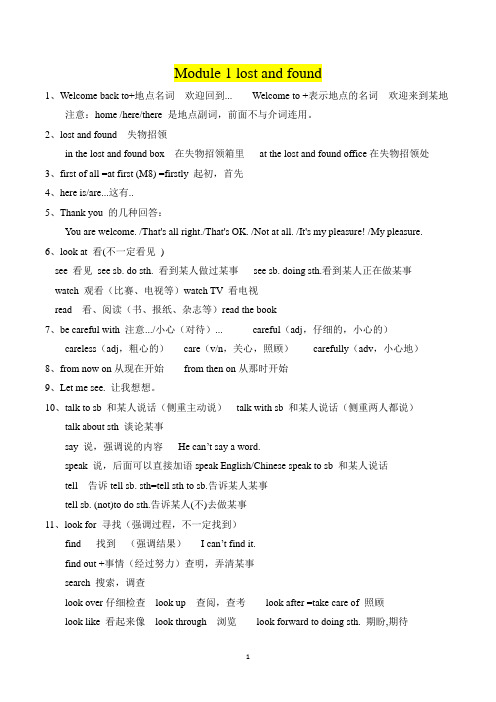
Module 1 lost and found1、Welcome back to+地点名词欢迎回到... Welcome to +表示地点的名词欢迎来到某地注意:home /here/there 是地点副词,前面不与介词连用。
2、lost and found 失物招领in the lost and found box 在失物招领箱里at the lost and found office在失物招领处3、first of all =at first (M8) =firstly 起初,首先4、here is/are...这有..5、Thank you 的几种回答:You are welcome. /That's all right./That's OK. /Not at all. /It's my pleasure! /My pleasure.6、look at 看(不一定看见)see 看见see sb. do sth. 看到某人做过某事see sb. doing sth.看到某人正在做某事watch 观看(比赛、电视等)watch TV 看电视read 看、阅读(书、报纸、杂志等)read the book7、be careful with 注意.../小心(对待)... careful(adj,仔细的,小心的)careless(adj,粗心的)care(v/n,关心,照顾)carefully(adv,小心地)8、from now on从现在开始from then on从那时开始9、Let me see. 让我想想。
10、talk to sb 和某人说话(侧重主动说)talk with sb 和某人说话(侧重两人都说)talk about sth 谈论某事say 说,强调说的内容He can’t say a word.speak 说,后面可以直接加语speak English/Chinese speak to sb 和某人说话tell 告诉tell sb. sth=tell sth to sb.告诉某人某事tell sb. (not)to do sth.告诉某人(不)去做某事11、look for 寻找(强调过程,不一定找到)find 找到(强调结果)I can’t find it.find out +事情(经过努力)查明,弄清某事search 搜索,调查look over仔细检查look up 查阅,查考look after =take care of 照顾look like 看起来像look through 浏览look forward to doing sth. 期盼,期待12、get on/off the bus 上/下公交车get in/out of the car 上/下小车13、in a hurry 匆匆忙忙hurry up=come on 快点儿,赶紧hurry to do sth 匆忙去做某事(there’s)no hurry 不忙,不必着急P8314、every day 每天时间状语everyday 每天的,日常的(形容词,后面接名词)15、many other things 许多其他的东西16、at the/ this moment=now此时此刻,现在at that moment=then 在那时17、a lot of =lots of =some许多既可以修饰可数名词,也可以修饰不可数名词。
七年级英语下册单词默写外研版(精编)
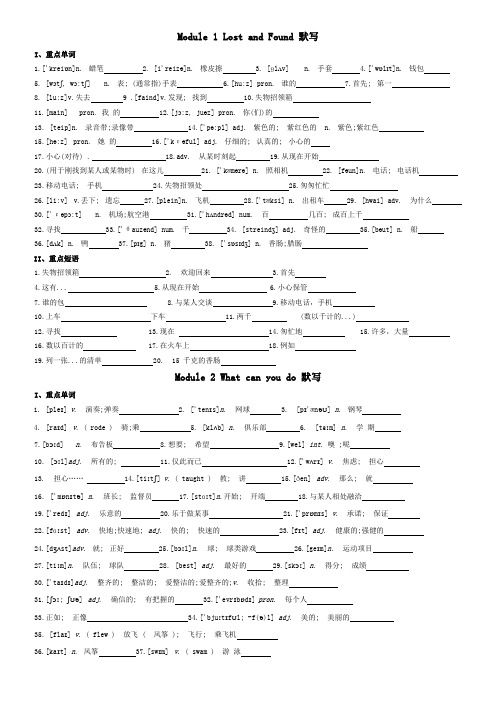
Module 1 Lost and Found 默写I、重点单词1.['kreiɒn]n. 蜡笔2. [i'reizə]n. 橡皮擦3. [ɡlʌv] n. 手套4.['wɒlɪt]n. 钱包5. [wɔtʃ, wɔ:tʃ] n. 表; (通常指)手表6.[hu:z] pron. 谁的7.首先; 第一8. [lu:z]v.失去9 .[faind]v.发现; 找到 10.失物招领箱11.[main] pron. 我的12.[jɔ:z, juəz] pron. 你(们)的13. [teip]n. 录音带;录像带14.['pə:pl] adj. 紫色的; 紫红色的n. 紫色;紫红色15.[hə:z] pron. 她的16.['kεəful] adj. 仔细的; 认真的; 小心的17.小心(对待) .18.adv. 从某时刻起19.从现在开始20.(用于刚找到某人或某物时) 在这儿 21. ['kæmərə] n. 照相机 22. [fəun]n. 电话; 电话机23.移动电话; 手机24.失物招领处 25.匆匆忙忙26.[li:v] v.丢下; 遗忘27.[plein]n. 飞机28.['tæksi] n. 出租车 29. [hwai] adv. 为什么30.['εəpɔ:t] n. 机场;航空港 31.['hʌndrəd] num. 百几百; 成百上千32.寻找33.['θauzənd] num. 千 34. [streindʒ] adj. 奇怪的 35.[bəut] n. 船36.[dʌk] n. 鸭 37.[pɪg] n. 猪 38. ['sɒsɪdʒ] n. 香肠;腊肠II、重点短语1.失物招领箱2. 欢迎回来3.首先4.这有...5.从现在开始6.小心保管7.谁的包8.与某人交谈9.移动电话,手机10.上车下车11.两千(数以千计的...)12.寻找13.现在14.匆忙地15.许多,大量16.数以百计的17.在火车上18.例如19.列一张...的清单20. 15 千克的香肠Module 2 What can you do 默写I、重点单词1. [pleɪ] v. 演奏;弹奏2. ['tenɪs]n. 网球3. [pɪ'ænəʊ] n. 钢琴4. [raɪd] v. ( rode ) 骑;乘5. [klʌb] n. 俱乐部6. [tɜːm] n. 学期7.[bɔːd] n. 布告板8.想要; 希望9.[wel] int. 噢 ;呢10. [ɔːl]adj. 所有的; 11.仅此而已12.['wʌrɪ] v. 焦虑; 担心13. 担心…… 14.[tiːtʃ] v. ( taught ) 教; 讲 15.[ðen]adv. 那么; 就16. ['mɒnɪtə] n. 班长; 监督员17.[stɑːt]n.开始; 开端18.与某人相处融洽19.['redɪ] adj. 乐意的20.乐于做某事21.['prɒmɪs] v. 承诺; 保证22.[fɑːst] adv. 快地;快速地; adj. 快的; 快速的23.[fɪt] adj. 健康的;强健的24.[dʒʌst]adv. 就; 正好25.[bɔːl]n. 球; 球类游戏26.[geɪm]n. 运动项目27.[tiːm]n. 队伍; 球队28. [best] adj. 最好的29.[skɔː] n. 得分; 成绩30.['taɪdɪ]adj. 整齐的; 整洁的; 爱整洁的;爱整齐的;v. 收拾; 整理31.[ʃɔː; ʃʊə] adj. 确信的; 有把握的32.['evrɪbɒdɪ] pron. 每个人33.正如; 正像34.['bjuːtɪfʊl; -f(ə)l] adj. 美的; 美丽的35. [flaɪ] v. ( flew ) 放飞 ( 风筝 ); 飞行; 乘飞机36.[kaɪt] n. 风筝37.[swɪm] v. ( swam ) 游泳II、重点短语1.在布告板上2.弹钢琴3.想要,愿意做某事4.煮鸡蛋5.仅此而已6.打乒乓球7.班长8.体育委员9.卫生委员10.学习努力11.乐意做某事12.在某方面做得好13.承诺做某事14.选某人当…15.擅长16.课间17.打扫卫生18.帮助某人做某事19.与某人相处融洽20.担心21.正如22.放风筝Module 3Making plans 词汇默写I、重点单词1.复习;练习2.['pɪknɪk] n. 野餐3.['haʊswɜːk] n. 家务劳动4.prep. 在……时候5.[els] adv. 其他; 另外6.['nəʊbədɪ] pron. 没有人7. prep. 在……点钟 8.['nʌθɪŋ] pron. 没有什么; 没有东西 9.['sɪlɪ] adj. 愚蠢的; 傻气的10.[fæn'tæstɪk] adj. 极好的 11.['fɔːwəd] adv. 面向未来的; 向前 12.盼望13.[fæn] n. 迷; 支持者 14.交朋友 15.[ʃɜːt] n. 球衣; (男式)衬衫16.[tʃɪə] v. 为……喝彩 17.['pleɪə] n. 运动员;选手 18.[həʊp]v. 希望19.[wɪn] v. ( won ) 赢;获胜 20.过得愉快 21.[maɪ'self; mɪ'self] pron. 我自己22.['djʊərɪŋ] prep. 在......期间 23.[meɪ]n. 5月 24.五一劳动节25.[leɪt] adv. 迟; 晚adj. 迟的; 晚的 26.[wɔːk] n. 步行; 走 27.散步28.['kʌntrɪ] n. 乡下; 乡村 29.['sek(ə)nd] num. 第二 30.[kə'lekt] v. 收集31.['lɪtə] n. 垃圾 32.[fʌn] n. 娱乐; 乐趣 33.暑假34.[kæmp] n. 营地;帐篷 35.[ɑ'strelɪən]adj. 澳大利亚的 36.['saɪtsiːɪŋ] n. 观光; 游览37.观光 38.[biːtʃ] n. 海滨; 海滩 39.['ɜːlɪ] adv. 早; 提前adj. 早的II、重点短语1. 复习2. 看电影3. 帮忙做家务4. 上钢琴课5. 在周末6. 野餐7. 在周六上午 8. 加入到我们中来 9. 在公园10. 做某人的家庭作业 11. 独自待在家里12. 盼望 13. 起床晚 14. 过得愉快15. 读书 16. 五一劳动节 17. 在五月二日18. 去游泳 19. 散步 20. 在公园里收集垃圾21. 观光 22. 与家人和朋友们一起度过时光23. 结交一些朋友 24. 在家25. 在五月一日的上午 26. 去夏令营27. 在海滩上 28. 听音乐 29. 环游世界30. 玩电脑游戏 31. 待在床上 32. 制定计划33. 去散步 34. 玩得愉快Module 4 Life in the future 词汇默写I、重点单词1. [tʃɔːk]n. 粉笔2. [ 'ruːlə] n. 直尺3. ['kærɪ] v. 拿 ; 带4. [tʃeɪn(d)ʒ] v. & n. 改变; 变化5.['evrɪθɪŋ] pron. 每样事物; 每件事; 所有事物6.['fjuːtʃə]n. 将来;未来在将来7.[laɪf] n. 生活; 生命8. [niːd] v. & v. aux. 需要9.[wɪl] v. aux. ( would ) 将; 将要; 将会10.['meɪbiː; -bɪ] adv. 也许11. [ɑːsk] v. 询问; 问 12. ['kwestʃ(ə)n] n. 问题13. [baɪ] prep. 用; 靠; 乘 (交通工具) 14. ['lev(ə)l] n. 水平15. ['eɪb(ə)l] adj. 能够……的 16.[mɔː] adv. 更加; 更adj. 更多的17.[friː] adj. (时间)空闲的; 空余的 18. [eə]n. 天空; 空中; 空气19. [lænd] n. 陆地20. [mə'ʃiːn] n. 机器21. [reɪn]n. 雨; 雨水 v. 下雨 22. ['rəʊbɒt] n. 机器人23. [siː] n. 海 ; 海洋24. [speɪs] n. 太空; 空间25. ['træfɪk] n. 交通26. [dʒæm]n. 堵塞; 拥挤27. [wɪnd]n. 风28.[truː] adj. 真的; 真实的29.(用于介绍某人或某物)下面30.(= bicycle) n. 自行车31[kɑː] n. 汽车; 轿车32. [tʃiːp] adj. 便宜的33. ['evrɪweə]adv. 到处; 处处34.['ɪntʊ; 'ɪntə] prep. 进入……里面 35. [lɒŋ] adj. 长的; 长时间的36. ['hevɪ] adj. 繁重的; 沉的 37. [laɪt] adj. 轻的; 轻松的; 少量的38. ['iːzɪ] adj. 容易的 39. ['wɜːkɪŋ] adj. (有关)工作的 40. ['aʊə] n. 小时41.[ʃɔːt] adj. 短的;短暂的;矮的42. [raɪz] v. ( rose ) 升起; 上升II、重点短语1.将来2.在因特网上3.(与)……交朋友4.能够做某事5.不再6.业余时间7.跟某人谈话8.需要做某事9.交通堵塞10.(希望、梦想等)实现11.一种新的…12.乘公共汽车13.(用于介绍某人或某物)这儿是…14.骑自行车15.不但…而且…16.全年,整年17.和,还,也18.在空中19.工作时间20.在农场21.繁重的工作22.做某事的方法23.在二十年后24.我不确定25.轻松而简单的工作26.大雨和强风27.和……玩Module 5词汇默写I、重点单词1.['mɑːkɪt]n. 市场2.['suːpəmɑːkɪt]n.超市3.['bɪskɪt]n. 饼干4.['lemən]n. 柠檬5.['strɔːb(ə)rɪ]n. 草莓6.母亲节7.[saɪz]n. 尺码; 号8.[teɪk]v. ( took ) 穿 (某尺寸的衣服或鞋子)9.v. aux. ( might ) 可以; 可能10.[traɪ] v. 尝试; 试穿; 品尝11.试穿 12.['sɜːt(ə)nlɪ; -tɪn-]adv. 当然; 行13.别急;稍等一会14.[seɪl] n. 降价出售 15.[praɪs]n. 价格16.[lʊk] v. 看起来; 显得 17.[freʃ] adj. 新鲜的 18.[əd'vɑːntɪdʒ]n. 有利条件; 优势19. [ ’enɪ,wʌn]pron. 任何人 20.['enɪθɪŋ]pron. 任何东西; 任何事情21. ['enɪweə]adv. 在任何地方; 往任何地方 22.[kəm'peə]v. 比较 23.[peɪ]v. 支付; 付钱24.[pəʊst]n. & v. 邮寄 25.['prɒdʌkt]n. 产品 26.[rɪ'siːv]v. 收到; 接到27.[seɪf]adj. 安全的 28.['sev(ə)r(ə)l]adj. 几个; 一些 29.[ɒn'laɪn]adj. 在线的30.['ʃɒpɪŋ]n. 购物 31.[weɪ]n. 方式; 道路 32......之一33.['ɔːlməʊst]adv. 几乎; 差不多 34.['sʌmθɪŋ]pron. 某事物; 某种东西 35.['leɪtə] adv. 后来; 以后36.['əʊp(ə)n] adj. 营业的; 开放的 37.[aʊt]adv. 外出; 离开 38.外出; 游玩39.['əʊvə]prep. 通过; 超过 40.总有一天 41.[wʌn] pron. (同一群人或物中)一个II、重点短语1. 服装店2. 半价3. 试穿4. 店员5. 太多6. 母亲节7. 等一下8. 付钱9. 改变一个人的生活10. 出去11. 网上购物 12. 一天13. 没有人 14.在任何时候 15. 由于 16. …的价格17.…中的一个 18. 省钱 19.等等 20.购物单Module 6Around town 词汇默写I、重点单词1. [bæŋk] n. 银行2. [mju'zi:əm] n. 博物馆3.[ə'lɔŋ] prep. 沿着4.[ə'krɔs] prep.越过5. [krɔs] v. 穿过6.['ɔpəzit] prep. 在……的对面7. ['tʊərist] n. 游客8.[ik'skju:s] v. 原谅; 谅解9.[stri:t] n. 街道10.[tə:n] v. 换方向11.[θɜ:d] num. 第三 12.['gaidbʊk] n. 导游手册; 旅行指南13.['bʊkʃɒp] n. 书店14.int. 好了(用于变换话题或活动); 是的; 好15.为什么不……呢? 16. [kəd] v. aux. 可以; 能17.[ˌʌndə'ɡraʊnd] n. 地铁18.[teik] v.搭乘;乘坐;固定使用;把(某人)带往;使(某人)到19.[tuə] n. (短期的)参观,游览; 旅行20. [skweə(r)] n. 广场21.['midl] n. 中部; 中间adj.中等的; 中部的22. ['feiməs] adj. 著名的23. ['peintiŋ] n.油画; 绘画24. [frəm] prep. 从……出发25. ['mi:tə(r)] (Am E meter) n. 米26.[ə'bʌv] prep. 在……上方; 在……之上27.['rivə(r)] n. 河; 江28.[kliə(r)] adj. (天气)晴朗的 29. [bridʒ] n. 桥30.['reilwei] n. 铁路31. [pɑ:st]prep. 路过(某物或某地);越过 32.[tʃɜ:tʃ] n. 教堂33.['finiʃ] v. 结束; 完成34.[hai] adj. 高的35.[pəust 'ɔfis] 邮政局36. [ʌp] prep. 沿着......而去. 37. [daʊn] prep. 沿着38. [stɔp] n. 车站39. [hɔːs] n. 马II、重点短语1.在……的前面2.到达3.劳驾;打扰了4.去……的路5.沿着……前行6.向左转7.在第三条街8.在左边9.在银行的对面10.在那边11.到达那里12.一个地铁站13.乘公共汽车14.许多名画15.大部分16.在晴朗的日子里17.参观伦敦的最好方式18.下船19.乘船返回20.从……旁经过21.紧挨着22.在……的另一边23.因……而出名作为……而出名Module 7 My past life 词汇默写I、重点单词1.[bɔːn] adj. (动词bear 的过去分词)出生2.[strɪkt] adj. 严格的; 严厉的3. ['fren(d)lɪ] adj. 友好的4.['praɪm(ə)rɪ]adj. 初等的; 初级的小学5.[taʊn] n. 城镇;市镇6.['vɪlɪdʒ] n. 村庄7.[naɪs] adj. 友好的; 亲切的8. [gʊd] adj. 乖的; 守规矩的9.['dɪfɪk(ə)lt]adj. 难对付的10. ['bɑːθruːm; -rʊm] n. 浴室11.['bedruːm; -rʊm] n. 卧室12. ['gɑːd(ə)n] n. 花园13.起居室; 客厅14.[iːst]adj.东面的; 东部的n. 东方15.[kəʊst]n. 海岸16. [ə'gəʊ]adv. 以前17.[stɔː] n. 商店18.(Br E theatre) 电影院19. [bɔːd]adj. 厌烦的; 厌倦的20. ['prezɪd(ə)nt]n. 总统21.['kʌmf(ə)təb(ə)l]adj. 舒适的; 舒服的22. [leɪk] n. 湖23.adj. (星期、月份等)最近过去的,紧接现在前面的24.[leɪk]adv. (在)昨天II、重点短语1.出生2.一个小村庄3…….名字4.小学5.对某人友好6.在课上表现好7.非常难对付的8.在……的东海岸9.对某人要求严格对某事要求严格10.电影明星11.最后一次12.过去的生活13.上映14.回去15.期待做某事16.有……要做有……正在发生Module 8 Story time 词汇默写I、重点单词1. [wə:k]n.头发2. [ɡəuld] n. 金色; 黄金; 金牌3.['fɒrist] n. 森林4. [wʌns]adv.一次; 一回5.[ə'pɔn, əpən] prep. 在……上; 到……上从前6.[di'said]v.决定7.散步8.['bɑ:skit] n. 篮子9. ['nəʊtis] v.注意到10.独自一人的11. [dɑ:k]adj. 黑暗的12.[pik] v.采;摘拿起; 举起13,[su:n] adv. 立刻; 不久14.[lɒst] a dj. 迷路的15. [ə'raʊnd] prep. 环绕着16.['litl] adj. 小的17. [tə'wɔ:dz] prep. 往; 向; 朝……方向18.[nɔk] v. 敲19.[dɔ:(r)] n. 门 20.['ɑ:nsə(r)] v. 应门; 回答 21. [pʊʃ] v. 推22.['entə(r)] v. 进入23. [bəʊl] n. 碗24. ['hʌŋgri] adj. 感到饿的; 饥饿的25.[rait] adj.合适的;恰当的 26.['finiʃ]v.吃完;喝完;用尽27.['aiðə(r)]adv.也(不)28.[pi:s]n.部件;碎片;一件/个/张破碎29.[ə'sli:p] adj. 睡着的30.[ri'tɜ:n] v. 返回; 归还31.[krai] v.哭;喊叫32.起初; 首先33.[pɔint] v.指向;指指着…… 34.[ʃaʊt] v. 高声说; 大声喊35. [dʒʌmp] v. 跳36.[wi'ðaʊt] prep. 无; 没有37. [pɑ:t]n. 部分; 地区; 地方II、重点短语1.从前2.决定做某事3.去散步4.摘花5.环顾四周6.敲门7.捡起8.破成碎片9.首先10.指着11.跳下床12.以……开始13.冲出房子14.高兴做某事15.急忙走向16.进入房子17.迷路18.独自Module 9 Life history 词汇默写I、重点句子1. [mɑːtʃ]n. 3 月2.['eiprəl]n. 4 月3.[dʒu:n] n. 6 月4.妇女节5.国庆节6.儿童节7. [dʒʊˈlaɪ]n. 7 月8.[ɔː'gʌst]n. 8 月9. [sep'tembə]n. 9 月10. [ɒk'təʊbə] n. 10 月11.[nə(ʊ)'vembə] n. 11 月12.[dɪ'sembə] n. 12 月13. ['raɪtə]n.作家14. [riːl]adj.真实的; 真正的15.['njuːzpeɪpə; 'njuːs-] n.报纸16.[ɪg'zækt; eg-] adj. 准确的; 确切的17.[ɪg'zækt; eg-]n.日期18. [bɪ'kʌm]v.(became )成为19.[pleɪ]n.剧本;戏剧 20.['pəʊɪm] n.诗歌 21. ['mærɪ]v. 结婚22.[sək'sesfʊl; -f(ə)l]adj.成功的23.[wɜːk]n.作品;著作 24.[bɪld]v. ( built ) 建造25.prep. 在……河边26.['faɪə]n.火;火灾27.[daɪ]v.死;去世28.[rɪtʃ] adj.富有的29.['læŋgwɪdʒ] n. 语言 30.[jʌŋ]adj. 年轻的II、重点短语1.世界各地2.发现; 查明; 弄清3.在……岁时4.在19 世纪60 年代5.为……写6.取名7.确切的日期8.开始工作9.在船上10.得到工作11.和……结婚12.学做某事13.开始做某事14.在某人的一生15.使用许多其他的语言16.成为一名成功的演员17.位于;坐落于18.值得做某事 19.离开学校20.毕业Module 10 A holiday journey 词汇默写I、重点单词1.[pə'sɪfɪk]adj. 太平洋的2.adv.那么(尤指用于引出新话题); 这么; 那么(用于强调质量、感觉或数量)3.[ges] v. 猜; 猜4. [ɪk'saɪtɪd] adj. 激动的; 兴奋的5.[ə'raɪv] v.到达6. [rɪ'læks]v.放松7.adj.举世闻名的8.[fren(t)ʃ]adj.法国的;法语的n.法国人;法语9.v. ( sold )卖;出售10.[tɒp]n. 顶端11. [tɪl] conj. 直到……为止12.[laɪt]n. 电灯13.adv. 在使用中; 开着的14.['pælɪs] n. 宫殿15.['wʌndəfʊl; -f(ə)l]adj. 绝妙的; 了不起的II、重点短语1.度假2.开车接/送某人到某地3.到达那儿4.多久5.呆在那儿6.电影明星7.首先8.前天9.例如10.购物11.给某人买某物把某物卖给某人12.不得不做某事13.街市14.排队等候15.乘船旅行16.给……拍照17,到达(大/小地方)18.在机场19.两年前20.你猜怎么着Module 11 Body language 词汇默写I、重点单词1. [baʊ]v.鞠躬;弯腰2.[kɪs]v. & n.吻;亲吻3.[ʃeɪk]v.( shook )摇晃握手4. [smaɪl] v. & n. 微笑5.['brɪtɪʃ] adj. 英国的; 英国人的6. ['dʒɜːmən] n. 德国人; 德语adj. 德国的; 德国人的;德语的7.[,dʒæpə'ni:z]n. 日本人; 日语adj. 日本的; 日语的;日本人的8.['rʌʃ(ə)n] n. 俄罗斯人; 俄语adj. 俄罗斯的; 俄罗斯人的; 俄语的9. ['vɪzɪtə] n. 游客;观光者10. ['rʌʃə] 俄罗斯11.[wɒt]int. 什么(表示惊奇)12.[nɒd] v. 点(头) 13.[hed]n. 头; 头部14.[hʌg]v. 拥抱; 紧抱15.[iːtʃ] pron. 各个; 每个互相; 彼此16.['ɪndɪə]印度17.[tə'geðə]adv.一起;共同18.['mauri] adj.毛利人的19. [tʌtʃ]v.触摸;接触20.[nəʊz] n. 鼻子21.['fɪŋgə] n.手指22.[fʊt] n. (pl. feet) 脚; 足23. [niː]n.膝盖24.[leg] n.腿25.[maʊθ]n.嘴;口 26.['bɒdɪ]n.身体;躯干27. ['fɒrɪn] adj.外国的28.北美人29. ['pɜːs(ə)n(ə)l]adj.个人的30.[ɑːm]n.臂;手臂臂挽臂地31.南美人32.[həʊld]v.( held )握着;使不动 33. [muːv]v.移动 34.['brɪt(ə)n]不列颠;英国35. [pə'laɪt]adj.礼貌的36.['sʌmweə] adv.某处;某个地方 37.[weɪv]v.挥(手);招(手);摆(手)38.[fækt]n.事实;细节39. [ruːd] adj.粗鲁的;无礼的40.[brɪŋ]v.( brought )带来II、重点短语1.和某人握手2.搬到…….3.搬开,搬走,离开4.根本不,全然不5.向某人挥手6.给某人展示某物7.点头8.摇头9..互相10.离…近,在…附近11.站的离……近12.向某人告别13..小心14.事实上,实际上15.把…放一起16.臂挽臂17.in different countries 在不同的国家18.别处19.三次20 抓住某人21.挥手告别21.按时22.站成一排23.做某事的方法/方式24.喜欢某人做某事Module 12 Western music 词汇默写I、重点单词1.['laɪvlɪ] adj. 活泼的; 轻快的2.['mɒd(ə)n] adj. 现代的3. ['nɒɪzɪ] adj. 吵闹的4. adj. 流行的; 受欢仰的5.[rɒk] n. 摇滚乐6. [saʊnd] n. 声音7.[vaɪə'lɪn; 'vaɪəlɪn]n.小提琴8. ['west(ə)n]adj.西方的9.prep.由……创作; 被;由10.[θruː] prep.穿过11.[bəʊθ]pron.两个;两者12['ɒp(ə)rə] n.歌剧13.[vɒɪs] n.声音14.[drʌm]n.鼓15.[bɪ'liːv] v.相信16.[mjuː'zɪʃ(ə)n]n.乐手;音乐家 17.['sentə](Am E center)n.中心 18.[jʊərə'piːən]adj.欧洲的19.['klæsɪk(ə)l]adj.经典的;古典的20.['sentʃʊrɪ]n.世纪21.[kəm'pəʊzə]n.作曲家22.['eldə] adj. 年长的23.[wɔːl(t)s; wɒl-]n.华尔兹舞(曲) 24.舞曲25.[ə'nʌðə] pron.又一个;再一个26.[piːs] n. (写作、音乐或艺术的)作品27.[pɔː; pʊə]adj.贫穷的28.['pɜːfɪkt] adj.完美的29.[sæd]adj.令人悲伤的;令人难过的II.重点短语1.考虑2.…的迷3.让我们清净会4.太;很;非常(表程度,修饰形容词,副词)5.在…的中心6.在…中间7.不但…而且…(连接两个主语时,就近原则)8.带领某人参观某地 9.一张,一片,一首…10.举办音乐会 11.穿过12.数以百计的13.举办;发生14.传统的西方音乐15.流行音乐16...的首都17.全欧洲18.在那时19.摇滚乐。
外研版七年级下册英语重点知识点汇总
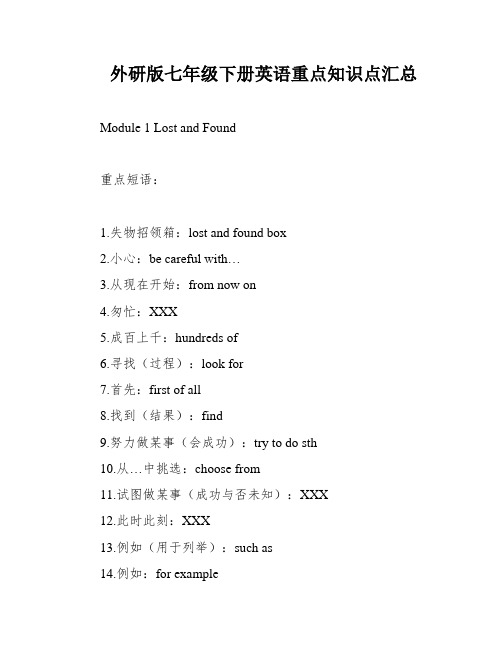
外研版七年级下册英语重点知识点汇总Module 1 Lost and Found重点短语:1.失物招领箱:lost and found box2.小心:be careful with…3.从现在开始:from now on4.匆忙:XXX5.成百上千:hundreds of6.寻找(过程):look for7.首先:first of all8.找到(结果):find9.努力做某事(会成功):try to do sth10.从…中挑选:choose from11.试图做某事(成功与否未知):XXX12.此时此刻:XXX13.例如(用于列举):such as14.例如:for example重点句型:1.这是谁的 (XXX)2.帮助某人做某事:help sb do XXX.3.请小心保管…:XXX…4.欢迎来到…:e to +地点5.给某人打call sb at +电话号码语法总结:物主代词:表示所属关系的代词(…属于谁的)单数:人称形容词性物主代词名词性物主代词第一人称 my XXX第二人称 your yours第三人称 his hers its复数形容词性物主代名词性物主代第一人称 our ours第二人称 your yours第三人称 their theirs形容词性物主代词:必须和名词在一起,例如XXX,your XXX…名词性物主代词:相当于与之相对应的形容词性物主代词+名词,例如XXX.Module 2 What Can You Do?重点短语:1.与某人相处融洽:get on well with sb.2.弹钢琴:play the piano3.打乒乓球:play table XXX4.…怎么样?=how about…。
what about…5.担心…:XXX…6.擅长做某事:be good at doing sth.7.放风筝:fly a kite重点句型:无语法总结:无2.high-tech高科技的3.XXX虚拟现实4.XXX机器人仆人5.XXX太空旅行6.XXX可再生能源7.self-driving cars自动驾驶汽车8.ic engineering基因工程9.XXX寿命10.artificial intelligence人工智能重点句型】1.In the future。
外研版初中英语初一下册Module 1 Lost and found 知识讲解

+ Module 1 Lost and found精讲精练词汇精讲1. welcomewelcome 是动词,意为“欢迎”,后面可以直接跟表示人的名词。
例如:Let ’s welcome the visitor . 让我们欢迎来宾。
【拓展】1) welcome sb. to sp. 欢迎某人到某地 例如:W elcome our friends to Beijing. 欢迎我们的朋友到北京来。
2) Y ou are welcome.意为“不用谢。
” 例如:— Thank you for your help. 谢谢你的帮助。
— Y ou ’re welcome. 不用谢。
2. minemine 是名词性物主代词,相当于 my + 名词。
例如:The coat is mine. 这件上衣是我的。
【拓展】(1) 名词性物主代词常用来避免和前面已提及的名词重复,相当于(形容词性物主代词 名 词)。
其分类形式如下:形式 人称单数 第一人称 第二人称第三人称复数 第一人称第二人称 第三人称 名词性物主代词 mine yours his hers its oursyours theirs(2) 名词性物主代词的用法:I. 名词性物主代词可用作主语、宾语和表语,可单独使用,其后不再跟名词。
1) 用作主语。
例如:That isn ’t my car . Mine is at home. 那不是我的汽车。
我的汽车在家里。
2) 用作宾语。
例如:I have brok en my pen. May I use yours? 我折断了我的钢笔。
我可以用一下你的吗? (作动词的宾语)He wasn ’t in my room. He might be in his. 他不在我的房间。
他可能在自己的房间。
(作介词的宾语)II. 名词性物主代词可与介词 of 构成短语,用作后置定语,表示从属关系。
例如:Jack is a friend of mine. Jack 是我的一个朋友。
外研版七年级下册Module 1(重点词句语法+语法专项训练+基础知识巩固训练+培优提升训练)

Module 1语法专项练习(Module 1)一、单选题1.The wild animals are in danger now. Let's protect __________.A. theyB. themC. theirD. theirs2.I bought a present for ________. I hope you like ________.A. your; thisB. yours; thatC. you; itD. you; one3.—Mary, is that girl in a red skirt our new roommate? —Yes. Let's go and say hello to ____________.A. sheB. hersC. her4.After-school activities help students gain more skills and teach_______to care about others.A. meB. youC. them5.Put the ingredients in the bowl and ________ please.A. mix them upB. mix it upC. mix up themD. mix up it6.There are some vegetables on the plate. Could you ________?A. cut up itB. cut up themC. cut it upD. cut them up7.________ is always sad to say goodbye to someone you love.A. ItB. ThisC. ThatD. One8.—Judy, is that boy with glasses __________new classmate?—Yes. Let's say hello to ____________.A. we; heB. us; himselfC. ours; hisD. our; him9.—Do you like _______? —Yes, I like ______very much.A. apple; themB. apples; itC. apples; theseD. apples; them10.My father has two basketballs and three soccer balls. But he doesn't play_______.A. themB. usC. meD. her11.—Do Kate and Sally like ______? —Yes, _______do.A. carrot; weB. carrot; theyC. carrots; weD. carrots; they12.—I think Mom can help_______. —OK. Let's ask her for help.A.meB. themC. itD. us13. —Is this new bag ? —No, it’s .A. his; hisB. his; hersC. yours; myD. hers; your14. Can I use ________ pen? ________ isn't here.A. you; IB. your; MyC. yours; MineD. your; Mine15. —My sister can't find her eraser.—Is the one on Jack's desk ________?A. sheB. herC. she'sD. hers16. —Here’s a postcard for you, Jim!— Oh, ________ is from my friend, Mary.A. heB. itC. sheD. it’s17. Between you and ________, he is not a real friend.A. meB. IC. heD. his18. Jim’s book is new. What about ______?A. yourB. himC. herD. mine19. schoolbag is beautiful. But is more beautiful.A. Jims’; myB. Jim’s; mineC. Jim’s; meD. Jims’; I20. — Excuse me. Is the camera ?— Oh, yes. I am looking for everywhere. Thank you very much.A. you; itB. your; oneC. yours; itD. yours; one21. ________are in the same class. We are good friends.A. Her and meB. She and IC. Me and sheD. I and her22. —Pandas are ________ favourite animal.—What are ________?A. her; yoursB. your; herC. hers; yoursD. yours; hers23. —Is this ________schoolbag?—No, ________ is on the sofa.外研版七年级下册A. yours; mineB. yours; myC. your; mineD. your; my24. These are my books. Where are ?A. theirB. theirsC. myD. your25. Miss Yang is English teacher. This dress is .A. we; sheB. we; herC. our; herD. our; hers二、语法填空1.After a busy morning at work, lunchtime gives ___________(I)a chance to do many things, such as exercise, read and watch TV.2.Miss Li teaches ___________ (they) English.3.Please call___________ (he) back after school.4.He plays volleyball with___________ (we) after school.5.Let's watch___________ (they) on TV.6.This is Miss Wang, she teaches ___________(we) English.7.Is that car yours? Yes, it is ___________. (I)8.Mike's hobby is playing basketball. ___________ is listening to the music. (I)9.That black and white dog is ___________ (my).10. Mr Yang is __________(we) teacher.___________(him) is from Beijing. __________(his) teaches_________(our) English.11. Look,there is a cat.__________(they) is Lily's._______(it) name is Mimi.12. Let_________(I) tell _________(she) about________(he) life at school.13. This is _________(they) room.Where is ________(our)?14. Don't use the eraser._________ is _________(me).15. The lady under the tree is ____________(me) aunt.___________(her) often sings with ___________(she) husband.基础知识巩固练习(Module 1)一、单选题( )1. schoolbag is new. But is old.A. My; Jim’sB. Mine; Jim’sC. Me; Jim’sD. I; Jim’s( ) 2. _______ mother usually cooks for ________ at the weekend.A. Lily and Nick; theirB. Lily’s and Nick’s; themC. Lily and Nick’s; theirD. Lily and Nick’s; them ( )3. Look, these are ___________bicycles. They are modern and cool.A. Jim and Tom’sB. Jim’s and TomC. Jim’s and Tom’sD. Jim and Tom( )4. —Is this maths book Betty's?—Yes, it's ________. Here is ________ name.A. her; herB. him; hisC. hers; herD. hers; hers( )5. —_______ is this pen?—It’s mine.A. WhatB. WhoseC. WhereD. How( )6. —gloves are these?—Sorry. I don’t know.A. WhoB. WhomC. WhoseD. Who’s( )7. Here ________ my gloves. Would you like to try them on?A. isB. haveC. areD. has( )8. —Do you eat ________ vegetables every day?—Yes, I like them ________.A. a lot; a lot ofB. a lot of; a lotC. a lot of; a lot ofD. a lot; a lot( )9. There are ________ of students in our school, but only ________ of them live in the school.A. hundreds; two hundredsB. hundred; two hundredsC. hundreds; two hundredD. hundred; two hundred( )10. A man is talking to a woman________ the lost and found office.A. toB. inC. atD. on( )11. This is ______ key and that is ______ eraser.A. a; aB. a; anC. an; aD. an; an( )12. Hurry up, _________ you will be late for class.A. andB. orC. butD. so( )13. Boys and girls, please welcome Tony ________ our class.A. toB. atC. inD. of( )14. —May I use your ________? I want to take some photos of the flowers. —Sure. Here you are.A. crayonB. computerC. watchD. camera( )15. —What are you doing?—I’m my mobile phone. I can’t it.A. finding; findB. looking; findC. looking for; findD. looking for; look for( )16. Do you have__________ to tell me?A. anything newB. something newC. something newD. new something( )17.—__________. Are these your orange gloves? —No. I don’t know _______ it is.A. Excuse me; whoB. Excuse me; whoseC. Sorry; whoD. Sorry; whose( )18. There is ________ basketball here. Do you like playing _________ baseball?A. a; aB. a; /C. the; theD. a; the( )19. Please be careful my iPhone X! It’s too expensive.A. byB. onC. atD. with( )20. There are vegetables, fruit, meat and many ________things in the supermarket.A. otherB. the othersC. anotherD. others( ) 21. Simon is ________his lost dog. Can you help him________ it?A. looking for; findB. finding; look forC. look for; findD. find; look for ( ) 22. It's very cool in Harbin in summer, so ________ people come here for vacation.A. thousands ofB. thousand ofC. two thousandsD. two thousand of ( ) 23. May I use your dictionary, Mary? I always ________mine at home.A. leaveB. chooseC. saveD. forget( ) 24. Water is very dangerous sometimes. So we must be careful _____ it.A. ofB. withC. toD. in( ) 25. We couldn't buy anything because ________of the shops were open.A. allB. bothC. nothingD. none( )26. The boy lost his favourite dog. That's ________ he looks sad.A. whatB. whyC. becauseD. how( )27. I have a new ______ . I can put my money in it.A. gloveB. walletC. eraserD. camera( )28. —It is raining . —Don’ t ______ until(直到) the rain stops.A. runB. stayC. comeD. leave( )29. Mr. Wang often ________ his dictionary in the library.A. leavesB. forgetsC. takesD. brings( )30. It’s not nec essary to find a friend who is the same you.A. inB. asC. toD. from( )31. Bill likes playing________basketball,but he doesn’t like playing________piano.A. the,theB. /,theC. the,/D. /, /( )32. __________ two boys are Mr Green's sons.A. ThisB. TheseC. ThatD. They( )33. __________ is Mr White and __________ is my father.A. This;thoseB. That;theseC. These;theseD. This;this ( )34. Look! is my green and blue sports bag and I like very much.A. This; itB. It; thisC. It; thatD. This; that ( )35. My mum can English very well. Now she’ s a story to my little brother.A. talk; sayingB. speak; tellingC. tell; talkingD. say; speaking ( )36. Tom his camera everywhere, but he can’t it.A. looks for; findB. looks for; look forC. finds; findD. finds; look for ( )37. —This is my lost watch. Thank you very much.—________.A. Don't say soB. The same to youC. Don't thank meD. You're welcome ( )38. — Here is a purple wallet. Is it yours?— Yes, it is. .A. That’s OKB. You’re welcomeC. Thank youD. That’s all right二、根据首字母、句意及汉语提示写出所缺的单词1. Be __________(小心的)not to be late for school again.2. __________(谁的)blouse is this? Is it yours?3. Look at your __________(手表), please. What’s the time now?4. This is Betty. The beautiful bike is __________(她的).5. Tony takes some photos with a new __________(相机).6. __________(数以千计的)of people come to visit Mount Tai every day.7. I lost my __________(钱包), so I don’t hav e any money now.8. Mother wants to buy a pair of __________(手套)for my birthday.9. How many __________(橡皮擦)have you got, Daming?10. The bookshop is next to the bus station. You can __________(找到)it easily.11. Be __________(小心), and don’t give the tiger any food.12. The story is very __________(奇怪的). I can’t believe it.13. Students often use __________(蜡笔)to draw pictures in art class.14. — Where are you going?— To the __________(机场). I want to take a plane to Shanghai.15. Tom doesn’t like the __________(香肠).16. It’s very __________ (奇怪). I don’t know it.17. It’s very far from our hotel to the station, you’d better take a __________ (出租车).18. Mr. Green _____________ (忘了带) his umbrella on the bus.19. We found three _____________ (鸭子) at the Lost and Found Office.三、用所给单词的正确形式填空1. These are my ____________ (eraser).2. Can you ____________ (find) the old map of the city?3. It's easy ____________ (lose) things when travelling.4. Is that blue bag ____________ (you)?5. There are different kinds of____________ (wallet) in the shop.6. These ____________(be not) his pens. ____________ (he) are black.7. My new book is in the ____________(lose) and ____________(find) box.8. Look!Here is a pair of ____________ (glove).9. There ____________ (be) a pair of gloves on the desk.10. —What are you ____________ (look) for?—I'm looking for my eraser.11. ____________ (thousand) of people visit the Great Wall every day.12. I want to buy five ____________ (kilo) of apples.13. Tom often ____________ (leave) his homework at home when he goes to school in a hurry.四、句型转换1. That's Daming's bag. (对画线部分提问)________ ________ ________ that?2. The young people on the bus come from Australia. (改为一般疑问句)________ the young people on the bus ________ ________ Australia?3. I think the watch is Lisa's. (改为否定句)I ________ ________ the watch __________ Lisa's.4. Some flowers are here for our teachers. (改为同义句)__________ __________ some flowers for our teachers.5. These are your gloves. (改为同义句)These __________ are__________.6. There is a picture book in Ben’s bag.(改为同义句)Ben ______ a picture book in _______ bag.7. There are some oranges and eggs on the table. (改为单数形式)________ ______ ______ orange and _______ egg on the table.8. Tom always runs into the classroom hurriedly.(改为同义句)Tom always runs into the classroom __________ __________ __________.9. Are these your ducks?(作肯定回答)__________, ___________________.10. We go to Yantai by boat.(对画线部分提问)__________ __________ you go to Yantai?11. I buy fifteen kilos of beef.(对画线部分提问)__________ __________ __________ of beef do you buy?12. We are looking for our cameras, too.(改为同义句)We are __________ __________ for our cameras.培优提高训练(Module 1)一、完型填空Bags of LoveLast year, I worked in a middle school near my mother's house, and I stayed with her for a month. During that time, I helped her do some housework and buy some1.After the first week, I noticed that the food was2very quickly. Then I began keeping an eye on my mum. To my surprise, I found that she would put some of the food into a paper3and go out with it at about nine every morning. And finally, I decided to follow her. I saw her taking the food to the street children. She would also4 a lot of time talking and playing with them.One day, I talked to a neighbor and found out that my mum was well-known in the area. The children were very friendly with her and even thought of her as their own5. Then it hit me — why wouldn't she want to tell me about it? Was she worried that I would stop buying food6I found it out?When my mum got home, I gave her a big hug. I told her she didn't need to keep it a7from me. And she told me something about the children. Some of them lived with an old lady in a small house. Others8on the street. For years, she was helping the poor street children by giving them food. After she told me everything, I was so moved by how selfless(无私的)she was. She helped others in need. As her son, I was so9of my mum.I10to buy food for my mum after that. But I always added one more bag for her other children.1.A. drinks B. clothes C. food D. fruit2.A. cleared out B. sold out C. thrown away D. eaten up3.A. bag B. box C. case D. basket4.A. take B. pay C. cost D. spend5.A. mother B. teacher C. sister D. friend6.A. although B. unless C. if D. before7.A. secret B. day C. joke D. present8.A. played B. ran C. cried D. slept9.A. surprised B. tired C. afraid D. proud10.A. stopped B. refused C. continued D. hated二、阅读理解AWhen talking about picking a right school, a mother and teacher gave some pieces of advice.In the latest issue (期) of Youth magazine, the mother shared the school advice she gave her daughters with young people across the country."I've told my daughters many times that I don't want them to choose a name," the mother said. "I don't want them to think, ‘Oh, I should go to these top schools.' We live in a country with hundreds of excellent universities. So the first question is: what's going to work for me?""When it was time to prepare for picking schools, nobody around me believed I could get into Xiamen University. But through hard work I finally made it," she continued. "So, my second piece of advice is: believe in yourself, no matter what other people might say. Once your goal is set, you only need to try your best to make it come true.""The last piece of advice is not to be worried even if your dreams don't come true. As I've said above, there are so many good universities out there. So it's important for everybody to understand that you can always find a university that gives you a great education."1.The mother shared her advice .A. with her studentsB. with her husbandC. in Youth magazineD. in Xiamen University2.To explain her second piece of advice, the mother gave .A. a story of her daughtersB. a story of her ownC. some different reasonsD. some different ideas3.We can learn from the last paragraph that .A. we can realize our dream through hard workB. the name of the university isn't the most importantC. it's not necessary to care what other people might sayD. more than one university can give us a good education4.The best title of the passage may be "".A. Colorful University LifeB. Best School EducationC. A Report on University BuildingD. Advice on School PickingBMr. Guo is a teacher from Xi'an. He asked his students to hand in their homework through the QR code(二维码). "We spent an hour or two in class learning how to generate(产生)the codes, and in the end everything gets easier," said Guo. "When students finish the homework, they keep it on WeChat. Then, each student makes his own QR code and gives it to me. So I can check their work anywhere using my computer or telephone."The QR codes can be sent to Mr. Guo by email, QQ and WeChat. When Guo scans(扫描) his students' QR codes, their homework appears on his phone. He finds that their homework becomes more creative, with many pictures, music and even videos.Guo's students like the new way and think it is interesting. "We are living in the information age. Many students like to work with computers, which makes learning more fun," said Tingting, a student of Guo's."The paper is not easy to keep, but the code is easy to keep and share," Guo said. "It is worth trying to use new technology in education. Education itself is a kind of creation. I don't want my students to fall behind the times."However, some parents are worried. They are afraid that their children will spend too much time on computers and less time communicating with teachers. But in fact, it's unnecessary. Students still need to look up information in books and write it down when they do their homework. They only use the code when they hand in their work, which doesn't take them too much time. Also for teachers, it allows them to check the students' work at any time. And it's also an easy way to share homework with other students.1.According to the passage, students can keep their homework on .A. WeChatB. QQC. emailD. blog2.Guo's students think the new way is .A. strangeB. boringC. interestingD. unnecessary3.What does "It" in Paragraph 4 refer to(指代)?A. The paper is not easy to keep.B. Keeping and sharing the code easily.C. Trying to use new technology in education.D. Education itself is a kind of creation.4.Some parents are worried, because they think their children will .A. talk with teachers face to faceB. spend too much time on computersC. not like the new way of handing in homeworkD. find the QR codes too difficult to useCWhat will the life be like in the future? Maybe no one knows because we never know what will happen in the future. But it's very interesting to make some predictions. Here are some exciting predictions.LanguagesEnglish should still be the most popular language, but Chinese should be the second. Now, many foreign people are studying Chinese as their second language. In the future, many other languages will disappear.WaterWater will become as expensive as oil because many rivers will disappear. We will have to save water and pay more for clean water.Education and ScienceStudents won't go to school. They will stay at home and study online. Students from all over the world may study together on the Internet. We may eat more genetically modified (转基因) food. And more robots will be around us. Lots of dangerous work will be done by them.TravelMore people will travel in their own country. Travelling in different countries will be more expensive and will take more time. Travelling by bus, by ship or by train may become very popular. Of course, flying may be the most popular.LivingPeople will live and work under the sea. Perhaps there will be big towns, factories and farms under the sea, too. Everyone will carry a pocket computer. The computer will give people all the answers to all their questions.1. What are many people learning as their second language now?A.Chinese.B.English.C.Japanese.D.French.2. Why will water become expensive according to the passage?A.Because more people will need water.B.Because there will be more water pollution.C.Because many rivers will disappear.D.Because oil will be cheaper.3. Travelling _____ will be the most popular.A.by busB.by shipC.by trainD.by plane4. Which is TRUE according to the passage?A.Chinese will be the most popular language.B.We have to save oil and pay more for oil.C.People don't like genetically modified food at all.D.Students can stay at home and study on the Internet.5. The main idea of the passage is about _____.A.the school lifeB.the life in the futurecation and scienceD.the most popular languageDEvery morning my father buys a newspaper on his way to work. Every evening my mother looks through magazines at home. And every night, I look at the posters with photos of David Beckham and Yao Ming on my bedroom wall before I go to sleep. Can we imagine life without paper or print?Paper was first created about 2,000 years ago, and has been made from silk, cotton, bamboo, and, since the 19th century, from wood. People learned to write words on paper to make a book. But in those days, books could only be produced one at a time by hand. As a result, they were expensive and rare. And because there weren’t many books, few people learned to read.Then printing was invented in China. When printing was developed greatly at the beginning of the 11th century, books could be produced more quickly and cheaply. As a result, more people learned to read. After that, knowledge and ideas spread quickly.Today information can be received online, downloaded from the Internet rather than found in books, and information can be kept on CD-ROMs or machines such as MP3 players.Computers are already used in classrooms, and newspapers and magazines can already be read online. So will books be replaced by computers one day? No, I don’t think the Yao Ming p oster on my bedroom wall will ever be replaced by a computer two metres high!1.What does the writer do before he goes to sleep’?A. He reads books.B. He reads newspapersC. He looks through magazinesD. He looks at the posters on the wall.2.When was paper first created?A. About 2.000 years ago.B. In the 19th century.C. About 1.000 years ago.D. In the 11th century.3.Why were books expensive and rare before the invention of printing?A. People could not read.B. People could not write words on paper.外研版七年级下册C. People could not find silk, cotton or bamboo. D People could only produce books one at a time by hand4.What happened after books became cheaper?A. People didn’t want to buy books.B. Printing was invented in China.C. Knowledge and ideas spread quickly.D. The Internet was introduced to people soon5.What is the writer’s opinion about books and computers’?A. People won’t need books any moreB. Books won’t be replaced by computers.C. People prefer to find information in books.D. Computers have already replaced books.三、词汇运用A)根据括号中所给单词的中文意思完成短文。
外研版英语七年级下册模块知识点归纳

Module 1 Lost and foundWhose bag is this?必背单词1. watch n.表;手表→watche s pl.手表2. lose v.失去→lost(过去式)失去3. find v.发现,找到→found(过去式)发现4. mine pron.我的→my(形容词性物主代词)我的5. yours pron.你(们)的→your(形容词性物主代词)你(们)的6. hers pron.她的→her(形容词性物主代词)她的7. careful adj.仔细的;认真的;小心的→carefully adv.仔细地;认真地;小心地8. crayon n. 蜡笔9. eraser n. 橡皮擦10. glove n. 手套11. wallet n. 钱包12. whose pron. 谁的13. tape n. 录音带;录像带14. purple adj. 紫色的;紫红色的;n. 紫色;紫红色必背短语15. first of all 首先,第一16. look at 看17. be careful with 小心(对待)……18. from now on 从现在开始19. a lot of 许多,大量20. lost and found box 失物招领箱必背句子21. Welcome back to school, everyone!欢迎大家返校!22. Whose bag is this?这是谁的书包?23. Here's a purple wallet!这里有一个紫色的钱包!24. Let me see...让我看看……Are they yours? 必背单词1. leave v.丢下;遗忘→left(过去式)丢下;遗忘2. strange adj.奇怪的→stranger n.陌生人3. camera n. 照相机4. phone n. 电话;电话机5. plane n. 飞机6. taxi n. 出租车7. why adv. 为什么8. airport n. 机场;航空港9. hundred num. 百10. thousand num. 千11. boat n. 船12. duck n. 鸭13. pig n. 猪14. sausage n. 香肠;腊肠必背短语15. mobile phone 移动电话;手机16. lost and found office 失物招领处17. in a hurry 匆匆忙忙18. hundreds of 几百;成百上千19. look for 寻找20. at the moment 目前;此时必背句子21. Welcome to the New York City Lost and found office.欢迎来到纽约市的失物招领处。
初中英语外研版七年级下册M4U1知识点讲解

七年级英语下册M4U1知识点讲解1.Life (名词) “生活;生命”Eg: Life in the future.未来的生活2.chalk (不可数名词) “粉笔”Eg: a piece of chalk一根粉笔chalk (可数名词) “粉笔”表种类时可数Eg: some coloured chalks一些彩色粉笔3.paper (不可数名词) “纸”Eg: a piece of paper 一张纸paper (可数名词) 论文;文件Eg: Please hand in your papers.请把你的论文交上来。
4.carry sth.to + 地点带某物去某地Eg: Please carry this book to the classroom.请把这本书带到教室。
Carry, bring, take, carry 区别:Carry (动) “带”,指随身携带Bring (动) “带来”,从别处带到说话人处Take (动) “带去”从说话人处带到别处get (动)“去拿”离开去取在回来,强调动作的往返。
5.change (动词) 改变常见搭配:change … into…把..变成…change … for…用…换…changes (n.) 零钱Eg: She changed the kid into a bird.她把这个小孩变成一只鸟。
6.Everything (不定代词) “一切事物”注意:作主语时,谓语动词用单数Eg: Everything is ready.一切准备就绪。
7.Different (形容词) “不同的”-- difference (名词) “不同点”常见搭配:be different from... “与...不同”Eg: This book is different from that one.这本书和那本不同。
8.in the future 特指将来的某一刻Eg: Do you want to go to America in the future?你将来想去美国吗?in future 指从今以后的全部将来Eg: I hope you’ll be careful in future.我希望你未来小心。
外研版七年级下英语七年级英语下 Module 1短语
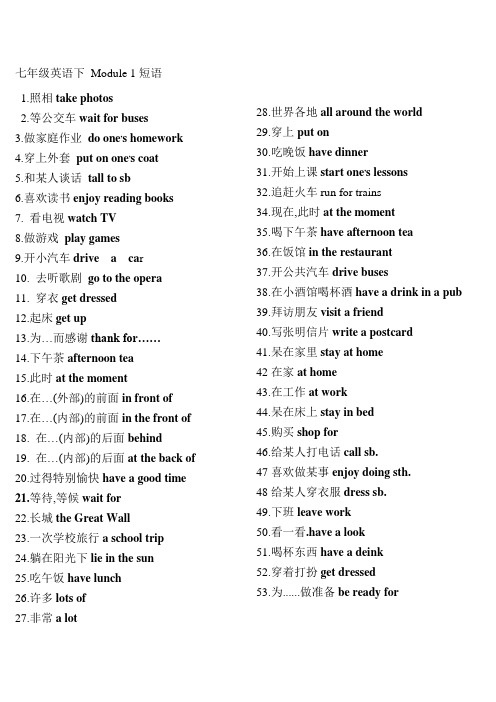
七年级英语下Module 1短语1.照相take photos2.等公交车wait for buses3.做家庭作业do one,s homework4.穿上外套put on one,s coat5.和某人谈话tall to sb6.喜欢读书enjoy reading books7. 看电视watch TV8.做游戏play games9.开小汽车drive a ca r10. 去听歌剧go to the opera11. 穿衣get dressed12.起床get up13.为…而感谢thank for……14.下午茶afternoon tea15.此时at the moment16.在…(外部)的前面in front of17.在…(内部)的前面in the front of18. 在…(内部)的后面behind19. 在…(内部)的后面at the back of20.过得特别愉快have a good time21.等待,等候wait for22.长城the Great Wall23.一次学校旅行a school trip24.躺在阳光下lie in the sun25.吃午饭have lunch26.许多lots of27.非常a lot 28.世界各地all around the world29.穿上put on30.吃晚饭have dinner31.开始上课start one,s lessons32.追赶火车run for trains34.现在,此时at the moment35.喝下午茶have afternoon tea36.在饭馆in the restaurant37.开公共汽车drive buses38.在小酒馆喝杯酒have a drink in a pub39.拜访朋友visit a friend40.写张明信片write a postcard41.呆在家里stay at home42在家at home43.在工作at work44.呆在床上stay in bed45.购买shop for46.给某人打电话call sb.47喜欢做某事enjoy doing sth.48给某人穿衣服dress sb.49.下班leave work50.看一看.have a look51.喝杯东西have a deink52.穿着打扮get dressed53.为......做准备be ready for。
外研版初一英语(下册)知识点归纳

MODULE 1一.短语归纳。
1. lost and found box 失物招领箱2.be careful with…小心…3. from now on 从现在开始4.(be) in a hurry 匆忙5. hundreds of 成百上千6.look for 寻找(过程)7. first of all 首先8.find 找到(结果)9. try to do sth 努力做某事(会成功)10.choose from 从…中挑选11.try doing sth 试图做某事(成功与否未知)12. at the moment 此时此刻13. such as 例如(用于列举)14. for example 例如二.重点句型结构1.Whose + 名词+is this ? 这是谁的…?2.help sb do sth. 帮助某人做某事3.Please be careful with…请小心保管…4.Welcome to + 地点欢迎来到…5.call sb at + 电话号码拨…给某人打电话三.语法专项。
物主代词:表示所属关系的代词(…属于谁的)人称单数复数形容词性物主代词名词性物主代词形容性物主代词名词性物主代词第一人称my mine our ours 第二人称your yours your yours第三人称his histheir Theirs her hersits its形容词性物主代词和名词性物主代词的关系:形容词性物主代词:必须和名词在一起。
My father, your teacher...物主代词名词性物主代词:相当于与之相对应的形容词性物主代词+名词。
This shirt is mine. =This is my shirt.MODULE 2一.短语归纳。
1. get on well with sb. 与某人相处融洽2.play the piano 弹钢琴3.play table tennis 打乒乓球4.what about…? =how about…?...怎么样?5.worry about…担心…6.be good at doing sth. 擅长做某事7.fly a kite 放风筝8.that’s all 仅此而已9.be ready to do sth. 乐于做某事二.重点句型结构。
外研版七年级下册M2U1学习讲义 课文翻译 重点短语句子,语法讲解

Module 2Unit1一.课文翻译大明:看!本学期的新社团公布在布告板上了。
我想参加音乐社团,因为我会弹钢琴。
你呢,贝蒂?贝蒂:我喜欢烹任,所以我能参加餐饮社。
你会做饭吗,大明?大明:不,我不会。
噢,我会做鸡蛋,不过仅此而已。
玲玲呢?她能参加哪个社团? 贝蒂:我认为她想参加舞蹈社团,因为她跳舞跳得很好。
托尼,你呢?托尼:我想参加汉语社团。
我的汉语说得不是很好。
大明:别担心你的汉语。
我们可以教你汉语。
所以选个你最喜欢的社团吧。
托尼:那好吧。
我打乒兵球,所以我选择乒球社团。
那是我最喜欢的!二.重点短语1. table tennis 乒乓球2. play the piano 弹钢琴3. play table tennis 打乒乓球4. ride a bike 骑自行车5. speak Chinese 说汉语6. would like to do sth. 想要做某事7. worry about 担心8. play football 踢足球9. the Music Club 音乐俱乐部三.重点句型1. The new clubs for this term are on the board. 本学期新的俱乐部已经在布告板上.。
2. I’d like to join the Music Club. 我想加入音乐俱乐部。
3. Can you cook, Daming? 大明,你会做饭吗?4. I can cook eggs, but that’s all. 我会炒鸡蛋,但是仅此而已。
5. Which club can she join? 她能加入哪个俱乐部?6. I think she’d like to join the Dancing Club because she can dance really well. 我认为他愿意加入舞蹈俱乐部因为她跳舞跳的真的很好。
7. How about you? 你呢?8. I can’t speak Chinese very well. 我说汉语说得不好。
外研版七年级下册Module1-Module6词汇,短语,语法,作文复习总汇
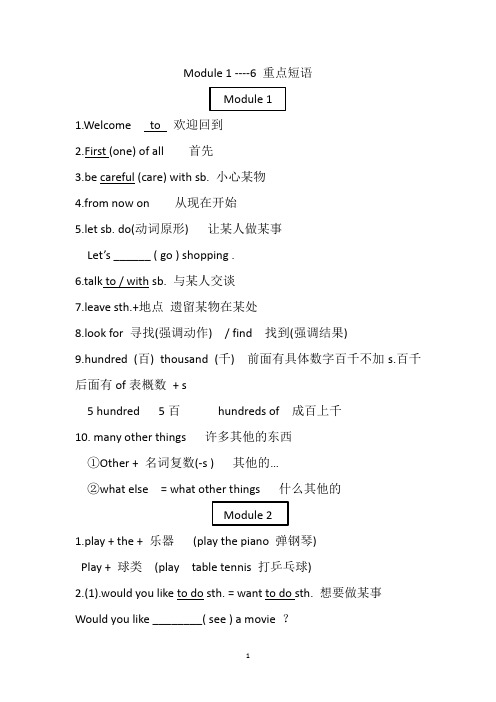
Module 1 ----6 重点短语Module 11.Welcome to 欢迎回到2.First (one) of all 首先3.be careful (care) with sb. 小心某物4.from now on 从现在开始5.let sb. do(动词原形) 让某人做某事Let’s ______ ( go ) shopping .6.talk to / with sb. 与某人交谈7.leave sth.+地点遗留某物在某处8.look for 寻找(强调动作) / find 找到(强调结果)9.hundred (百) thousand (千) 前面有具体数字百千不加s.百千后面有of表概数+ s5 hundred 5百hundreds of 成百上千10. many other things 许多其他的东西①Other + 名词复数(-s ) 其他的…②what else = what other things 什么其他的Module 21.play + the + 乐器(play the piano 弹钢琴)Play + 球类(play table tennis 打乒乓球)2.(1).would you like to do sth. = want to do sth. 想要做某事Would you like ________( see ) a movie ?(2).like doing sth. 喜欢做某事I like ________( see ) a movie .(3) enjoy doing sth. 喜欢做某事I enjoy ________( see ) a movie .(4). enjoy oneself 玩得开心enjoy myself 我玩得开心enjoy yourself 你玩得开心enjoy (herself/himself) 他/她玩得开心enjoy (yourselves/ourselves/themselves)你们/我们/他们玩得开心3.What about / how about + v.ing …怎么样?What about ________(see )a movie ?4.worry about (sb./sth. )担心某人/某物= be worried about (sb./ sth.)5.teach sb. sth. 叫某人某事Miss Suo teach _______( us / our ) English .6. get on well with sb. 与某人相处得好7.be good at doing sth. 擅长做某事= do well in doing sth. …做得好She is good at ______ (swim) .=______________________8. be ready to do sth. 准备做某事I am ready ______ ( go ) to school .9.promise to do sth. 许诺做某事I promise _______ (help) you .10.①help sb. ( to ) do sth. 帮助某人做某事We help our mother ______ (clean ) the rooms .②Help sb. with sth. 在某方面帮助某人11.make + v.原/ adj.形容词使…e with sb. 与某人一起来13.stay with sb. 与某人待在一起Module 31.be going to do sth. 打算做某事We are going to______ (have ) a picnic .2.look forward to doing sth. 期盼做某事I am look forward to _______ (see ) a movie .3. (1). spend (花费) 用法①sb.(某人) spend money/time on sth. 某人在某物上花费时间/钱②sb.(某人) spend money/time (in) doing sth.某人在某做某事上花费时间/钱(2) take (花费)①It take time to do sth. 做某事花费时间(3). Cost (花费/价值)Sth. cost sb. money 某物花费某人钱/某物值…钱(4). Pay for (支付)Sb. pay money for sth. 某人支付…钱为某物!练习:用spend/take / cost/pay 填空(1.) It __________ me ten hours to get Nanning .(2.) I _______ me ten hours getting Nanning .(3.) The pen ______ me 10 yuan .(4.) We need _______ 10 yuan for the pen .4.Watch sb. do sth. 看到某人做了某事(看了全过程)5.Watch sb. doing sth. 看到某人正在做某事(看到正在发生片段)5.feel lonely 觉得孤独/ live alone 独自生活6.make friends 交朋友7.It’s time to do sth. 到做某事的时间了= It’s time for doing sth.It’s time _______( go ) home .=_______________________Module 41.A be different from B A与B 不同2. A be the same as B A与B 相同3.There will be = there is / are going to be 将会有4.be able to = can 能5.not …anymore 不再6.not only A but also B 不但A 而且B ( 就近原则) Not only you but also I ______( be ) good at English .7.①A as well as B A还有B ( 用A做主语)You as well as I ______( be ) good at English .②as well =too 也e true 实现9.have sth. to do .有某事要做We have a lot of books ______ ( buy ) .10.in+一段时间表将来( in 20 years’time 再20年后)I _______ ( see ) a movie in two days .11.It’s + adj.(形容词) + to do sth. 做…是…的。
外研版七年级下册M1U2学习讲义 课文翻译 重点短语句子,语法讲解
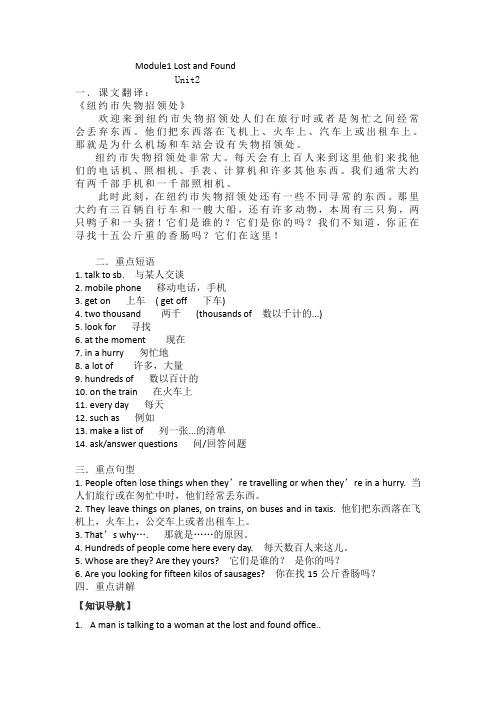
Module1 Lost and FoundUnit2一.课文翻译:《纽约市失物招领处》欢迎来到纽约市失物招领处人们在旅行时或者是匆忙之间经常会丢弃东西。
他们把东西落在飞机上、火车上、汽车上或出租车上。
那就是为什么机场和车站会设有失物招领处。
纽约市失物招领处非常大。
每天会有上百人来到这里他们来找他们的电话机、照相机、手表、计算机和许多其他东西。
我们通常大约有两千部手机和一千部照相机。
此时此刻,在纽约市失物招领处还有一些不同寻常的东西。
那里大约有三百辆自行车和一艘大船,还有许多动物,本周有三只狗,两只鸭子和一头猪!它们是谁的?它们是你的吗?我们不知道,你正在寻找十五公斤重的香肠吗?它们在这里!二.重点短语1. talk to sb. 与某人交谈2. mobile phone 移动电话,手机3. get on 上车( get off 下车)4. two thousand 两千(thousands of 数以千计的...)5. look for 寻找6. at the moment 现在7. in a hurry 匆忙地8. a lot of 许多,大量9. hundreds of 数以百计的10. on the train 在火车上11. every day 每天12. such as 例如13. make a list of 列一张...的清单14. ask/answer questions 问/回答问题三.重点句型1. People often lose things when they’re travelling or when they’re in a hurry. 当人们旅行或在匆忙中时,他们经常丢东西。
2. They leave things on planes, on trains, on buses and in taxis. 他们把东西落在飞机上,火车上,公交车上或者出租车上。
3. That’s why…. 那就是……的原因。
外研版七年级英语下册Module 1知识点汇总
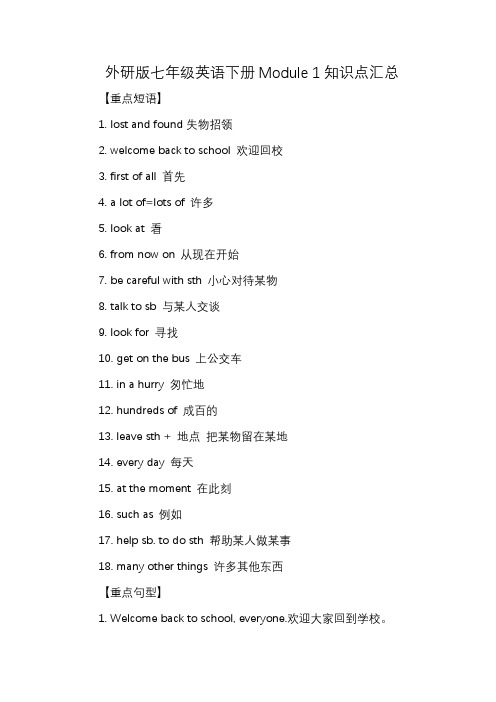
外研版七年级英语下册Module 1知识点汇总【重点短语】1. lost and found 失物招领2. welcome back to school 欢迎回校3. first of all 首先4. a lot of=lots of 许多5. look at 看6. from now on 从现在开始7. be careful with sth 小心对待某物8. talk to sb 与某人交谈9. look for 寻找10. get on the bus 上公交车11. in a hurry 匆忙地12. hundreds of 成百的13. leave sth + 地点把某物留在某地14. every day 每天15. at the moment 在此刻16. such as 例如17. help sb. to do sth 帮助某人做某事18. many other things 许多其他东西【重点句型】1. Welcome back to school, everyone.欢迎大家回到学校。
2. Please be careful with your things from now on.从现在开始请仔细看管你的东西。
3.Whose gloves are they?它们是谁的手套?4. People often lose things when they’re traveling or when they’re in a hurry. They leave things on planes, on trains, on buses and in taxis. 人们旅行或匆忙时经常丢东西。
他们把东西落在飞机上、火车上、公交车上或出租车里。
5. That’s why there are lost and found office at airports and stations. 那就是为何在飞机场和车站设有失物招领处的原因。
外研版七年级下册Module 1 词汇和语法知识点归纳及练习题(附答案)
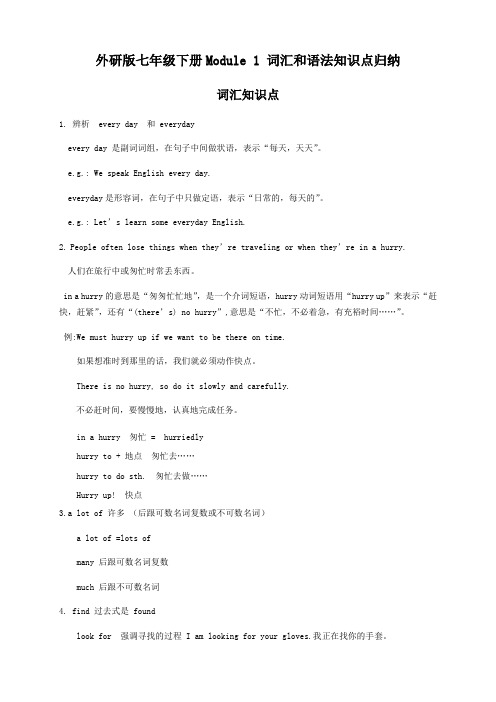
外研版七年级下册Module 1 词汇和语法知识点归纳词汇知识点1. 辨析 every day 和 everydayevery day 是副词词组,在句子中间做状语,表示“每天,天天”。
e.g.: We speak English every day.everyday是形容词,在句子中只做定语,表示“日常的,每天的”。
e.g.: Let’s learn some everyday English.2.People often lose things when they’re traveling or when they’re in a hurry.人们在旅行中或匆忙时常丢东西。
in a hurry的意思是“匆匆忙忙地”,是一个介词短语,hurry动词短语用“hurry up”来表示“赶快,赶紧”,还有“(there’s) no hurry”,意思是“不忙,不必着急,有充裕时间……”。
例:We must hurry up if we want to be there on time.如果想准时到那里的话,我们就必须动作快点。
There is no hurry, so do it slowly and carefully.不必赶时间,要慢慢地,认真地完成任务。
in a hurry 匆忙 = hurriedlyhurry to + 地点匆忙去……hurry to do sth. 匆忙去做……Hurry up! 快点3.a lot of 许多(后跟可数名词复数或不可数名词)a lot of =lots ofmany 后跟可数名词复数much 后跟不可数名词4. find 过去式是 foundlook for 强调寻找的过程 I am looking for your gloves.我正在找你的手套。
find 强调寻找的结果 I find your gloves.我找到你的手套。
5. hundred 是一个确数,表示“一百”hundreds of 是一个概数,表示“好几百,许许多多”当 hundred 前面有一个具体的数词时,hundred 不变为复数。
外研版七年级下册英语知识点及短语
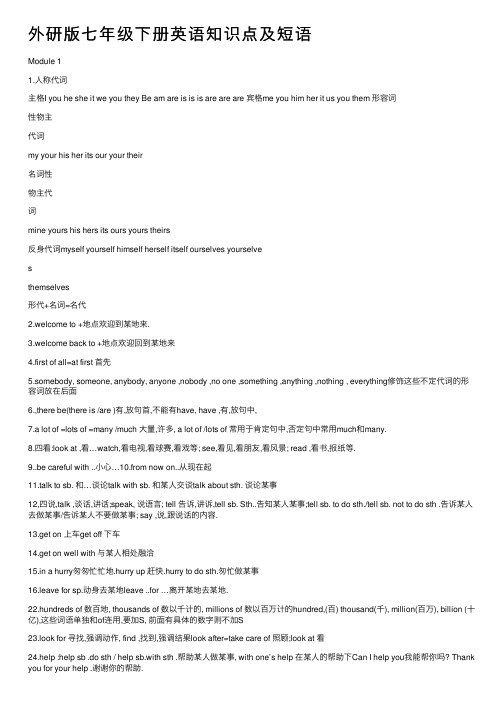
外研版七年级下册英语知识点及短语Module 11.⼈称代词主格I you he she it we you they Be am are is is is are are are 宾格me you him her it us you them 形容词性物主代词my your his her its our your their名词性物主代词mine yours his hers its ours yours theirs反⾝代词myself yourself himself herself itself ourselves yourselvesthemselves形代+名词=名代2.welcome to +地点欢迎到某地来.3.welcome back to +地点欢迎回到某地来4.first of all=at first ⾸先5.somebody, someone, anybody, anyone ,nobody ,no one ,something ,anything ,nothing , everything修饰这些不定代词的形容词放在后⾯6.,there be(there is /are )有,放句⾸,不能有have, have ,有,放句中,7.a lot of =lots of =many /much ⼤量,许多, a lot of /lots of 常⽤于肯定句中,否定句中常⽤much和many.8.四看:look at ,看…watch,看电视,看球赛,看戏等; see,看见,看朋友,看风景; read ,看书,报纸等.9..be careful with ..⼩⼼…10.from now on..从现在起11.talk to sb. 和…谈论talk with sb. 和某⼈交谈talk about sth. 谈论某事12,四说,talk ,谈话,讲话;speak, 说语⾔; tell 告诉,讲诉,tell sb. Sth..告知某⼈某事;tell sb. to do sth./tell sb. not to do sth .告诉某⼈去做某事/告诉某⼈不要做某事; say ,说,跟说话的内容.13.get on 上车get off 下车14.get on well with 与某⼈相处融洽15.in a hurry匆匆忙忙地.hurry up 赶快.hurry to do sth.匆忙做某事16.leave for sp.动⾝去某地leave ..for …离开某地去某地.22.hundreds of 数百地, thousands of 数以千计的, millions of 数以百万计的hundred,(百) thousand(千), million(百万), billion (⼗亿),这些词语单独和of连⽤,要加S, 前⾯有具体的数字则不加S23.look for 寻找,强调动作, find ,找到,强调结果look after=take care of 照顾;look at 看24.help :help sb .do sth / help sb.with sth .帮助某⼈做某事, with one’s help 在某⼈的帮助下Can I help you我能帮你吗? Thank you for your help .谢谢你的帮助.25.think of 想起,想出think about 考虑think over 仔细考虑26.choose from 从…中挑选27.try to do sth. 尽量做某事,尽⼒做某事try not to do sth .尽⼒不做某事try doing sth 尝试做某事try one’s best to do sth .尽⼒做某事try on试穿,试戴28.ask sb. not to do sth .要求某⼈不要做某事, ask sb. to do sth .要求某⼈做某事ask for 询问寻求29.such as 例如30.回答Thank you /Thanks 的句⼦:You’re welcome /Not at all /That’s OK ,/That’s all right ./It’s a pleasure/My pleasure30.leave,遗忘,主要指东西忘在某地⽅,leave sth +地点forget 记忆遗忘31.call sb. 给某⼈打电话, call sb. at +电话号码Module 21.下棋play +球/棋, 不加the play the piano 弹钢琴弹拉乐器,play the +乐器, 要加the2.speak Chinese 说汉语speak English 说英语speak +语⾔3.worry about 担⼼be worried about 对…担⼼,忧虑4.join +组织, take part in 参加活动5.get on well with sb.与某⼈相处得好get on badly with sb .某⼈相处得不好get up 起床, get to 到达6.promise to do sth .答应做某事, promise not to do sth 答应不做某事promise sth .to sb. 许诺某⼈某物.7.I’m sure +句⼦, / I’m sure of /about sth .8.teach oneself ⾃学teach sb. sth .教某⼈某事teach sb. to do sth .教某⼈做某事9.询问意见:1.How about /What about doing sth ? 2.Why not /why don’t you do sth ?/ Would you like to do sth?/ Shall we do sth?./ let’s do sth.10.Would like =want ,想要,愿意, would like sth .想要某物; would like to do sth. 想要做某事;would like sb. to do sth.想要某⼈做某事,Would you like sth ? 回答:Yes ,please . /No ,thanks.11.be good at =do well in 擅长…后跟V-ing12,between⽤于两者,between …and13.tidy up 收拾,整理,14.make sth./sb. +形容词,使某⼈某物怎么样; make sb .do sth 使某⼈做某事,相当于have sb.do sth .=let sb. do sth .15.do cleaning 做清洁do some reading 读书do some washing 洗⾐do some shopping 购物16.ride a bike 骑⾃⾏车,动词短语; 17.fly a kite 放风筝18.swim well 游泳很好well,好地,副词,修饰动词19.Would like to do sth.想做某事20.Would you like to do sth ?你愿意做某事吗?这是有礼貌地提出建议或邀请的句型.肯定回答:Yes ,I’d like /love to . 否定回答:Sorry ,/I’d like to /I’d love to ,but I…..21.like doing sth .喜欢做某事,习惯性的动作;like to do sth .喜欢做某事,暂时性的22.祈使句:肯定祈使句以动词原形开头,否定祈使句以Don’t +V原形开头, 听话你是you.23.问职业:1)What +am/is /are+⼈? 2)What do/does +⼈+do ? 3) What’s one’s job?24.start doing sth .开始做某事, start to do sth .开始做某事, 注:下列情况中start 后接to +V 原形,不能接ing ,1)进⾏时态, 2) start 的主语是物时.25.a kind of ⼀种all kinds of 各种各样的kind of有点26.get ready to do sth 准备做某事be ready to do sth .乐于做某事27.enjoy doing sth .喜欢做某事, enjoy oneself =have a good time =have fun 玩得⾼兴28.keep fit = stay fit =keep healthy =stay healthy保持⾝体健康29.It’s +形容词+(for sb).+to do sth .外界的⽤for ,It’s adj.of sb. to do sth. 本质,⼈格30.give sth to sb .=give sb sth 给某⼈某物give up doing 放弃做某事31.that’s all.仅此⽽已Module 3.语法:⼀般将来时:标志词:tomorrow ,the day after tomorrow ,next…, in +⼀段时间,soon 等.结构: am /is /are going to do sth .或will do sth .there be 的将来时:there is /are going to be 或there will be ….come ,go ,leave ,arrive 的现在进⾏时表将来时.be going to do 和will 的区别:be going to 指打算,计划,will,事先未思考或未计划,be going to do 表⽰近期眼下就要发⽣的事情,will,表⽰将来时间则较远⼀些;be going to 表⽰根据主观表⽰通过客观迹象表明马上要发⽣的,⽽will 是客观上将来势必发⽣的事情.1.have a picnic,野餐go for a picnic 去野餐2.have a meeting 开会; have a walk 散步have a rest 休息have a fight 打架have a look 看⼀看Have classes /lessons 上课3.else,修饰不定代词或特殊疑问词时,放后⾯,且只能修饰这两类词. 如:something else ,somebody else , What else …即:any-,every-,some -,no-开头及由-body ,-one ,thing,- where结尾的不定代词的后⾯.4.on ⽤于具体的某天,并对早中晚进⾏了修饰的也⽤on ;at ⽤于具体的时刻,⼏点.或短语:at night ,在晚上, at noon 在中午at that time 在那时at lunch 在午餐时at the age of 在…岁时in ⽤于年⽉季节,世纪,⼀段时间, in the morning 在上午, in spring 在春天5.alone 孤单的,孤独的,是指个体⼀个⼈, lonely 孤独的,孤寂的,是指内⼼孤独,孤寂6.look forward to doing sth .盼望做某事;7.take a walk=go for a walk 去散步make friends with sb .与某⼈交朋友8.go sightseeing 去观光go –ving go swimming 去游泳go fishing 去钓鱼go boating 去划船9.make a plan做计划plan to do sht .计划做某事10.at the weekend =on the weekend 在周末,11.hope to do sth. 希望做某事hope +that +句⼦12.be busy(in) doing sth ./be busy with sth 忙于做某事13.spend 的⽤法: sb. spend time /money (in) doing sth .花时间/⾦钱做某事Sb. spend time /money /on sth .某⼈在某物上花时间/⾦钱Take 的⽤法:It takes sb .sometime to do sth .14.be different from …与..不同the same as.与…相同15.because of 因为,由于,后跟名词,代词等. Because 后跟句⼦.16.It’s time to do sth .到了该做某事的时间了, It’s time for sth .17.go over 复习18.check my email 查收我的电⼦邮件19.see a movie 看电影20.in the park 在公园⾥21.have a piano lesson 上⼀节钢琴课22.summer holiday 暑假23.go on a summer camp 参加夏令营24.listen to music 听⾳乐26.have fun doing sth .做…很⾼兴. .类似的有,have a good time ,enjoy oneself27.⼈称顺序:你他我, 我们,你们,他们,当要承担责任时,I要放在前⾯.28.在乡下,in the country , 在城市,in the city29.待在家,stay at homeModule 4.1.a piece of paper, ⼀张纸2.a piece of ⼀条,⼀则,⼀⽀,⼀张….3.in the future 在将来4.in+⼀段时间,⽤于将来时,⽤how soon, 提问5.everyone只能指⼈,不能指物, 不能与of 连⽤, 如果与of 连⽤,⽤every one of ,都表单数. no one⽤来回答who ,指⼈,不与of 连⽤, none 回答how many ,指⼈,或物,可与of 连⽤,即:none of6.be able to 相当于can ,,但can 可⽤于主观,⽽be able to ⽤于客观.7.not.. any more=no more 不再,强调数量和程度,⼀般修饰短暂性动词,指某动作不再重复, not ..any longer =no longer 不再,⼀般⽤于延续性动词,表⽰某个动作或状态不再延续, no longer /no more ⾏前be 后/doc/a5dc7a36fd00bed5b9f3f90f76c66137ee064f62.html e true 实现,成真9.change …for…⽤…换….. 10.mean doing sth..意味着做某事11. mean to do sth. 打算做某事12.问天⽓,what’s the weather like ?/ how is the weather?13.四个也:as well,也, 肯定句末,不⽤逗号, too ,也,肯定,句末,逗号隔开. also 也,肯定,句中,⾏前be 后, either 也,否定,句末,逗号隔开14.not only …but also.不仅…⽽且…,谓语动词就近原则15.job,⼯作,可数, work ,⼯作,不可数16,expensive 昂贵的,反义词:cheap 形容物17.interesting 有趣的, 修饰物,后可跟名词, interested ,有趣的,修饰⼈,不可跟名词这类似词有:relax ,excite ,bore ,tire ,…加ing 修饰物,后可跟名词,加ed ,修饰⼈,不可跟名词18.play with 和..⼀起玩19.how much 多少,对不可数数量提问,how long ,多久,对for +⼀段时间等提问, how often多久⼀次,频率提问, how far ,多远,问距离.20.at home 在家, 21.on the Internet 在⽹络上22.all year⼀整年23.free time 空余时间24.chalk 粉笔,不可数名词,可以说some chalk,或a piece of chalk25.by+交通⼯具, by bus ,by bike ,by car ,by train ,by plane=by air, by boat ,by ship=by river=by sea, on foot ,这些是介词短语,放句末,26. maybe ,⼤概,也许,相当于perhaps ,常位于句⾸, may be ,可能是,也许是27.让某⼈做某事:make sb. do sth.=have sb. do sth.=let sb. do sth .28.问外貌:What +do/does +⼈+look like? 或:what +be +⼈+like?问性格:What +be +⼈+like?29.a change of. …的改变Module 51.buy sth for sb.=buy sb. sth 给某⼈买某物类似的有:make sth for sb. =make sb sth .3,what colour 什么颜⾊,对颜⾊提问in colour 有⾊彩的,有颜⾊的4.small ⼀般指⼈或物体的体积⼩,不带感情⾊彩;little ⼩的,带有感情⾊彩,多指对⼈或事物的怜爱.5.try on 试穿,⾐物,代词放中间,名词放后⾯6.too much ,太多,修饰不可数名词,too many 太多,修饰可数名词, much too ,太,⾮常,后跟副词或形容词7.wait for sb. /sth .等候,某⼈或某物,后跟等待的对象.8.a sale on =on sale 打折,降价出售9.half ,⼀半的,half a year ,半年, half a month ,半⽉, half an hour 半⼩时, 注:⼀个半⼩时:one and a half hours =an hour and a half.10.price 价格,问价格可以⽤:how much +be +物?=what’s the price of …注:修饰price 只能⽤low (低,), high(⾼), 形容东西便宜或贵⽤expensive 或cheap.11.have got =have 12.Can I help you?=What can I do for you ?有什么需要帮助的吗?13.How much ,多少,可以对不可数名词的数量,也问价格;how many ,对可数名词数量提问.14.some ,any ,every ,no,可以和thing, one ,body ,where 可以组成不定代词,修饰他们的形容词放后, 和any 组合的⽤于疑问或否定句,和no 组合的,本⾝是否定式.15.safe ,形容词,安全的,反义词:dangerous 危险的,It is +adj+to do sth./It is +for sb. +adj. to do sth .(外界的原因),It is of sb .to do sth.(⼈格,品质)16.pay for ,⽀付pay sb. money for sth .付给某⼈钱买某物.17.四个花费: spend :sb. spend money on sth .Sb. spend time on sth ./sb. spend time (in )doing sth .Take :It takes some time to do sth ./It took some time to do sth .Pay : sb. pay money for sth .Cost : sth .cost sb. money18.life 的复数是live s all one’s life 某⼈⼀⽣, come to life 苏醒过来give one’s life to 献⾝于….19.one of ….中之⼀,后⾯动词⽤第三⼈称单数形式One of the +形容词最⾼级+名词复数后⾯动词⽤三单.20.receive a letter from sb. 收到某⼈的来信,相当于hear from sb.21.a few ,few 修饰可数名词, a little ,little 修饰不可数名词,有a 表⽰有,肯定,没有a 表⽰没有,表否定./doc/a5dc7a36fd00bed5b9f3f90f76c66137ee064f62.html pare …with ..与…作⽐较,同类⽐较;compare ..to …⽐作, 不同类⽐较23.one day ,某⼀天,既表⽰过去的某⼀天,也表⽰将来的某⼀天.24.as…as.中间跟形容词或副词的原级, as …as you can 尽可能….=as..as possible25.popular ,受欢迎的,be popular with ….受..的欢迎.26.and so on 等等27.look at ..看..28.wait a minute 等⼀等29.the price of ….的价格,形容price ⾼⽤high, 低,⽤low.问价格:How much is/are …..? What’s the price of ….30.half price 半价31.at any time 在任何时候32.all right 好吧, 33.go out 出去34.May….? 回答:Yes ,you may /No, you can’t /No ,you mustn’t (表⽰禁⽌,不同意)35.what size ⽤尺码, 36.try to do sth.试图做某事;try doing sth .尝试做某事try one’s best to do sth .尽某⼈最⼤努⼒去做某事.37.乘坐交通⼯具:动词短语: take a /the bus /car /train /plane/taxi ….to +地点drive a car to +地点ride a bike to +地点, walk to +地点fly to 地点介词短语: go to +地点+by car /bus /bike /taxi /train /plane /…/on footgo to +地点+on a /the bus /train/plane ..ship/bike/ in a car/taxi38.way 做某事的⽅式/⽅法,a way to do sth ./ a way of doing sth.on one’s way to 在某⼈去….的路上; by the way 顺便问/说⼀下;in this way ,⽤这种⽅法in the way 挡道; lose one’s way 迷路39.on the Internet 在⽹上, 40.at any time 随时,在任何时候;at times 有时,;in time 及时;on time 按时;at the same time 同时. Module 6.介词:in 在…之内on 在…上⾯; over.在…正上⽅under 在….正下⽅above 在…上⽅, below 在…下⽅by /beside 在…旁边near 在…附近next to 紧挨…. behind 在…后⾯before 在…之前outside 在…外⾯to 到…去from从…来round/around围绕…. Between .在…之间(两者)among 在…之间(三者或三者以上) across 横过、越过……(表⾯横过)through 穿过…内部,⾥⾯通过onto 向上into 进⼊…. Out of …从…出来along 沿着up 向上down 向上opposite 在.. 对⾯问路的句型:Can/Could you tell me the way to ….?Can/Could you tell me how to get to…?Excuse me .Where is ….?How can I get to …?Is there a (an) …near here ?Do you know the way to ..,please ?I want to go to …Do you know the way?I’m looking for …Can you tell me where it is ?1.turn left /turn right 向左转/向右转2. go along =go on =go down沿着,3.Excuse me ,请问;劳驾;对不起,⽤来客所地打断别⼈的话,表对不起,通常在说或做可能令⼈不悦的事情之前使⽤; sorry ,在说或做这种事情之后使⽤,表⽰歉意.4.on a clear day 在晴朗的⼀天5.finish doing sth. enjoy doing sth. practice doing练习做某事, mind doing (介意)6.be famous for …以…(事物,客观的)著名.be famous as ..表⽰以…(⾝份,职业)著名7.get to=arrive in(⼤地⽅)/arrive at (⼩地⽅)=reach 到达8.go across=cross穿过across ,穿过,越过,越过⼀个平⾯, through 穿过(⾥⾯)9. on the right of /on the left of 在…的右边/左边;on one’s left /on one’s right .10. turn 的短语:turn on 打开; turn off 关上turn up 开⼤turn down 关⼩…11.Why not do sth?+Why don’t you do sth .?为什么不…呢提建议建议:1.why don't you do sth?=why not do sth?2.How about doing sth?=what about doing sth?3.You should /can do sth.4.Remember to do sth.5.Don't forget to do sth.6.can you do sth ?7.Let's do sth. 8.It'sa good idea to do9.would you like to do ? 10.Shall we do11.You'd better (not )do sth.回答:That's a good idea.Thanks a lot.Great, OK. That's right. All right. Good idea. Sure.12.tell sb.sth.=tell sth .to sb. 告诉某⼈某事tell sb. to do sth ./tell sb .not to do sth .告诉某⼈做某事,/告诉某⼈不做某事类似的有:ask sb. to do sth /ask sb. not to do sth . not 放在to 的前⾯13.the way to …去…的路on the way to ….在去….的路上.后跟home ,here ,there 不⽤to14.in front of 在.. 前⾯(外⾯) in the front of 在..(内部)前⾯15.on the other side of 在…的另⼀边16.over there 在那边17.in the middle of 在…的中间18.learn about 了解19.get off ,下车, get on 上车. 20.on the concer of…在…的拐⾓处21.between ,两者之间, among三者或三者以上之间22.on both sides of在….的两边on either side of..在…的(任何)⼀边23,the best way to do sht .做某事的最好⽅法24.How do I get to …我该怎样才能到达…Module 7⼀般过去时:⼀般过去时表⽰过去某个时间⾥发⽣的动作或存在的状态,表⽰过去习惯性、经常性的动作或⾏为等。
外研版初中英语七年级下册词汇总结

外研版初中英语七年级下册词汇总结本文档总结了外研版初中英语七年级下册的词汇内容,旨在帮助学生复和巩固所学的词汇知识。
以下是词汇表:单元一:My School- pencil: 铅笔- pen: 钢笔- ruler: 尺子- book: 书- classroom: 教室- teacher: 老师- student: 学生- desk: 书桌- chair: 椅子- blackboard: 黑板单元二:My Family- father: 父亲- mother: 母亲- brother: 兄弟- sister: 姐妹- grandfather: 爷爷- grandmother: 奶奶- uncle: 叔叔- aunt: 阿姨- cousin: 堂兄弟/堂姐妹- family: 家庭单元三:My Friends- friend: 朋友- classmate: 同学- playmate: 玩伴- neighbor: 邻居- best friend: 最好的朋友- meet: 见面- talk: 谈话- help: 帮助- share: 分享- laugh: 笑单元四:My Day- morning: 早上- afternoon: 下午- evening: 晚上- night: 夜晚- get up: 起床- have breakfast: 吃早饭- go to school: 去学校- have lunch: 吃午饭- do homework: 做作业- go to bed: 上床睡觉单元五:My Room - room: 房间- bed: 床- desk: 书桌- chair: 椅子- closet: 衣柜- lamp: 台灯- window: 窗户- door: 门- clock: 时钟- picture: 图片单元六:My Hobby- hobby: 爱好- read: 阅读- draw: 画画- sing: 唱歌- dance: 跳舞- play sports: 进行体育运动- collect stamps: 收集邮票- play musical instruments: 弹奏乐器- take photos: 拍照- watch TV: 看电视以上是外研版初中英语七年级下册的词汇总结,希望对学生们的复习有所帮助。
七年级英语外研版下册Module 1 Lost and found.重点短语积累及知识点讲解

外研版七年级下册Module 1重点短语积累及知识点讲解重点短语:1.lost and found box失物招领箱Come and look in the lost and found box!2. be careful with小心对待…Please be careful with your things from now on.3. from now on从现在 (用于现在进行时)I will study hard from now on. .4. in a hurry匆匆忙忙People often lose things when they’re in a hurry.5. hundreds of几百,成百上千Hundreds of people come here every day.6. look for寻找They are looking for their cameras7. first of all首先First of all, Look at this nice watch.8.try to do sth_尽力做某事We should try to help others.9. choose from…从……中挑选You can choose one from these books.10. a lot of许多 = lots of =many /muchThere are a lot of animals.11. at the moment此时此刻 (用于现在进行时)12. They are playing the piano at the moment.12. such as例如There are a lot of things, such as phones and watches.13. have got有 has gotHe has thousands of gloves.14.welcome back to school 欢迎回到学校15.leave sth at…..把…..忘在…..I left my bag at home.16.many other things 许多其它的东西They are looking for cameras, watches and many other things17. help sb (to) do sth /help sb with sth 帮助某人做某事They can help you find them.Unit1 重点知识点讲解1. whosewhose作代词,意为“谁的”。
七年级下册英语外研版1~12单元重点词语总结

七年级下册英语外研版1~12单元重点词语总结一、Unit 1: My day1. get up2. have breakfast3. go to school4. have classes5. have lunch6. go home7. do homework8. go to bed二、Unit 2: This is my sister.1. family2. sister3. brother4. mother5. father6. grandmother7. grandfather8. cousin三、Unit 3: Is this your pen?1. pen2. pencil3. ruler4. eraser5. bag6. book7. notebook8. pencil case四、Unit 4: Do you like pears?1. like2. don't like3. love4. hate5. apple6. banana7. peach8. orange五、Unit 5: Do you have a soccer ball?1. have2. don't have3. has4. don't has5. soccer ball6. basketball7. volleyball8. tennis racket六、Unit 6: Whose bike is this?1. whose2. bike3. hat4. dress5. coat6. shoes7. socks8. jacket七、Unit 7: It’s r本人ning1. r本人ny2. windy3. snowy4. sunny5. cloudy6. hot7. cold8. stormy八、Unit 8: What’s your favorite food?1. favorite2. food3. fruit4. vegetable5. meat6. rice7. noodles8. soup九、Unit 9: What does he look like?1. look2. tall3. short4. thin5. fat6. strong7. weak8. handsome十、Unit 10: Can you play the guitar?1. can2. can't3. play4. sing5. dance6. swim7. draw8. run十一、Unit 11: What are you doing for vacation?1. vacation2. holiday3. trip4. travel5. camp6. pic7. visit8. relax十二、Unit 12: How do you go to school?1. go by bus2. go by bike3. go by car4. go on foot5. go by subway6. go by tr本人n7. go by plane8. go by boat以上为七年级下册英语外研版1~12单元的重点词语总结,希望同学们能够认真掌握这些词语,提升自己的英语水平。
外研版七年级英语下册M1-6重点总结
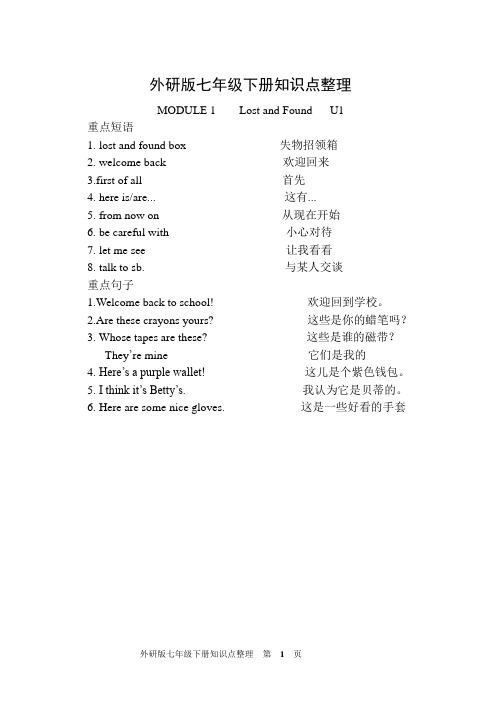
外研版七年级下册知识点整理MODULE 1 Lost and Found U1重点短语1. lost and found box 失物招领箱2. welcome back 欢迎回来3.first of all 首先4. here is/are... 这有...5. from now on 从现在开始6. be careful with 小心对待7. let me see 让我看看8. talk to sb. 与某人交谈重点句子1.Welcome back to school! 欢迎回到学校。
2.Are these crayons yours? 这些是你的蜡笔吗?3. Whose tapes are these? 这些是谁的磁带?They’re mine 它们是我的4. Here’s a purple wallet!这儿是个紫色钱包。
5. I think it’s Betty’s.我认为它是贝蒂的。
6. Here are some nice gloves. 这是一些好看的手套MODULE 1 Lost and Found U2重点短语9. mobile phone 移动电话,手机10. get on the bus 上车11. two thousand 两千12. look for 寻找13. at the moment 现在14. in a hurry 匆忙地15.many other things 许多其他的东西16. hundreds of 数以百计的17. strange things 奇怪的东西18. fifteen kilos of sausages 15公斤的香肠19. such as 例如重点句子7. They leave things on planes, on trains, on buses and in taxis.8. That's why there are lots and found office is at airports and stations9. Hundreds of people come here every day.10.They are looking for their phones cameras, watches, computers and many other things11.There are about a hundred bikes and a large boat12. Are you looking for fifteen kilos of sausages?7.他们把东西落在飞机上,火车上,公交车上或者出租车上。
- 1、下载文档前请自行甄别文档内容的完整性,平台不提供额外的编辑、内容补充、找答案等附加服务。
- 2、"仅部分预览"的文档,不可在线预览部分如存在完整性等问题,可反馈申请退款(可完整预览的文档不适用该条件!)。
- 3、如文档侵犯您的权益,请联系客服反馈,我们会尽快为您处理(人工客服工作时间:9:00-18:30)。
外研版七年级下册单词与短语Module 1单词
*buy v.买
call v.打电话
drive v.开车
enjoy v. 享受
lie v. 躺下
*shop v.逛商店;购物
*take v.获得;拿;抓
take photos 拍照
*tell v.讲;告诉
*wait v.等
*for prep.为;为了
*wait for 等待;等候
*postcard n. 明信片
the Great Wall 长城
*really adv. (表语气)真的吗a good time 美好时光
a lot 非常
anyway adv.无论如何,反正car n. 小汽车
put on 穿上
*thing n.事情;东西
leave v. 离开
work n.&v. 工作at home 在家
pub n.洒馆
*restaurant n.饭馆
opera n.歌剧
ballet n.芭蕾舞
sleep n&v.睡觉
*wash v.洗;洗涤
dress v.穿衣服
*start n&v.开始
midday n. 正午
*hot dog 热狗
coffee n.咖啡
see v.探望;看见
greeting n.问候;致意
at the moment 现在,此时
look at 看……
*soon adv.立刻;不久
*love n.&v.爱;热爱
See you later 再见。
*night n.夜晚
good night 晚安(打招呼用语)*street n.街道
Unit 1
1. 玩的高兴,过的愉快have a good time; have fun; enjoy oneself
2. 听到某人说话hear sb.
3. 长城the Great Wall
4. 与某人谈话talk to sb.; talk with sb.
5. 在郊游on a trip
6. 照相take a photo; take photos
7. 在太阳底下in the sun
8. 给某人寄某物send sb. sth; send sth. to sb
9. 非常喜欢…… enjoy… a lot
10. 回家go home
11. 买。
shop for…
Unit 2
1. 会见朋友meet / visit friends
2. 喝一杯have a drink
3. 坐车去某地go to … in a car or a bus
4. 穿上……. put on
5. 在此刻,当前,现在at the moment; at this moment
6. 在世界的不同地方in different places of the world
7. 下班leave work
8. 等候……. wait for…
9. 赶火车run for the train
10. 喝下午茶have afternoon tea
11. 在家at home
12. 走着去……walk to…; go to…on foot
13. 吃饭(正餐)have dinner
14. 去看歌剧go to the opera
15. 看芭蕾舞演出watch a ballet
16. 看电视watch TV
17. 打游戏,做游戏play games
18. 起床get up
19. 穿衣get dressed
20. (某人)开始上课start one’s lessons
21. 给家里打电话call home
22. 来自……的问候greetings from..
23. 谢谢你的……..,因……..而感谢某人thank you for …
24. 拜访朋友visit friends
25. 给某人写……… write…to sb.
26. 在某地玩的高兴enjoy one’s visit
Unit 3
1. 打电话call sb.; talk to sb. on the phone; make a call to sb.
2. 看……….look at
3. 听某人说话listen to sb.
4. 在学校过的愉快,喜欢学校生活enjoy school
5. 学习做某事learn to do sth。
